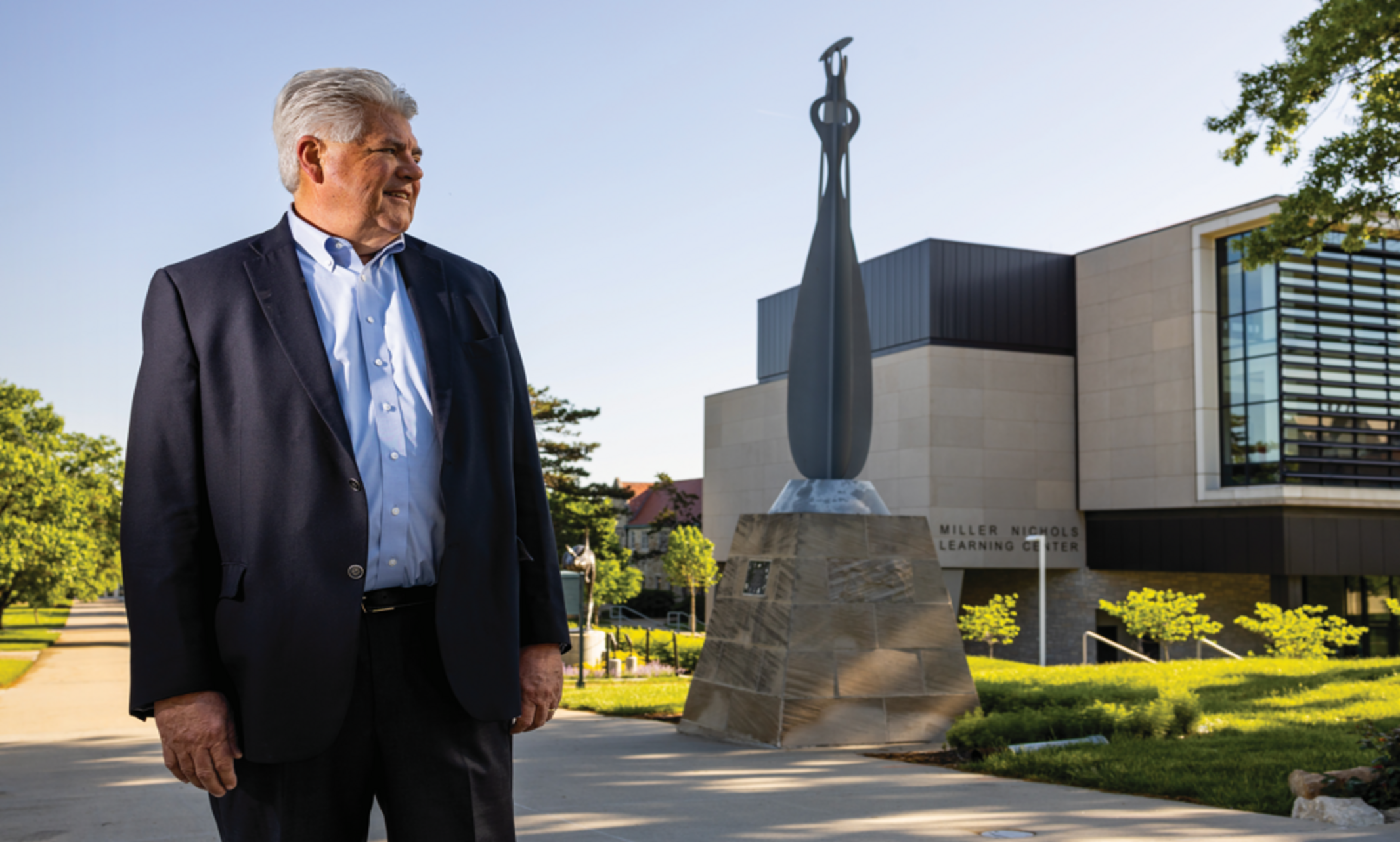
Hard work and persistence paved Judge Robert Altice Jr.'s path to the bench
As a young man, Judge Robert R. Altice Jr. (J.D. '87) was so unfamiliar with entering law school that he submitted his application too late to be accepted.
But that slight misstep early on did not keep him from a distinguished career that led to a seat on the Indiana Court of Appeals, the second-highest court in the state. Support from his family and a tenacious spirit allowed Altice to overcome the challenges he faced as a first-generation college student and rise to the top of his field.
Ascending the Legal Ranks
Altice began his legal career in Kansas City handling felony cases under Jackson County Prosecutor Albert Riederer. He remembers starting in the office his first day after passing the bar. Sitting at his desk, the boss came up with a stack of papers saying, "These are yours. There's a couple of murders in there. Get 'em worked up and get 'em ready for trial," Altice recalled. "They really kind of threw you in there."
After leaving the prosecutor's office, Altice focused on medical malpractice defense at the Kansas City law firm of Shughart Thomson & Kilroy, which later merged with the firm that is now Polsinello. Altice's memories from Kansas City include learning the ropes from assistant prosecutor Patrick Hall and taking law school classes taught by Professor Jack Balkin.
Altice and his family moved to Indianapolis in 1992. After a stint in private practice, Altice joined the Marion County prosecutor's office in 1994. He later won election and served on the Marion County Superior Court when then-Gov. Mike Pence appointed him to the court of appeals in 2015.
Altice had applied for a seat on the court of appeals twice before and had already decided his third attempt would be his last. Altice got to share high-fives and leaps of joy with friends upon getting word of his appointment when the governor's call came while Altice was on the golf course.
After calling his wife and parents, Altice had time to reflect. "I felt like my hard work and my parents' many sacrifices had paid off," he recalled. "I also thought about the huge responsibility I was about to take on and what an honor it was to be selected."
Altice's parents robed him at his investiture.
Humble Beginning
After missing that law school application deadline, Altice took a detour and earned a master's in criminal justice administration at what is now the University of Central Missouri. The silver lining to that change of plans, he said, is that he improved his grades from his undergraduate years and gained the confidence to succeed in law school.
Altice's parents, Robert and Louis, both from Rocky Mount, Virginia, instilled that drive to succeed in their son. Altice's father parlayed postsecondary training at an electronics school in Springfield, Missouri, into a long career repairing business equipment -- everything from calculators to computers. His dad's promotions kept the family on the move, including stops in New Jersey, Ohio and Kansas.
"They talked about their struggles and their lack of education," he said. "I just think they say (college) as the way to be more successful than they were, (and) when you eventually raise a family, to be successful at that as well."
Personal Success
In addition to pursuing his college education, Altice also prioritized his family life. He met his wide, Kris Altice (J.D. '89) when they were undergraduates at Miami University in Oxford, Ohio. Later, Kris joined him in Kansas City and she pursued a law career herself. Kris currently works as general counsel at the Indianapolis construction company Shiel Sexton.
Kris' appreciation for her husband's accomplishments stems in part from their contrasting upbringing, starting with the fact that she lived in the same house throughout her entire childhood.
The world of college was hardly a mystery to her when it came time to apply. Her parents met while attending Purdue University, and her mother served on the board of trustees at DePauw University. At age 33, and as the mother of five children, Kris' mom went back to school to earn her law degree, landing a position at a large Indianapolis law firm.
Small-town success stories typically involve kids whose parents were community leaders, like the sheriff of the superintendent or the principal, Kris said. Less frequent, Kris continued, is the tale of a boy who came from a family where the dad fixed typewriters and the mom prided herself on how she folded the laundry and cleaned the house.
"He came from nothing," she said. "He has an appreciation for all walks of life. He can befriend the wallflower, and he knows how to connect with people and reach out. He works hard, and when he says he is going to do something, he gets it done."
Her husband's transient childhood molded him into an extrovert, Kris said. He's the kind of guy who would befriend the elevator operator when such positions still existed, she said. The "overwhelming delight" of the overflow crowd at the ceremony marking his appointment to the court of appeals demonstrated the friendship and respect her husband enjoys.
The couple has two children: Kathleen, 27, and Jack, 30. Both kids followed in their parents' footsteps to attend Miami University. The Altices also have a niece who graduated from the UMKC School of Law this year.
An Honorable Achievement
Altice's parents are now retired and living in Tulsa, Oklahoma. All three of their children graduated from college, an accomplishment that brings them great pride.
Kris said it's likely that if you run into her mother-in-law at the grocery store, she will find a way to work in that she has a son who is a judge. And notes or cards from her always come addressed to the Hon. Robert R. Altice Jr.
"It's hysterical," Kris said. "There's no 'Bob.' She is so darn proud. It is just absolutely amazing. It brings tears to her eyes thinking about it."
Jun 30, 2022
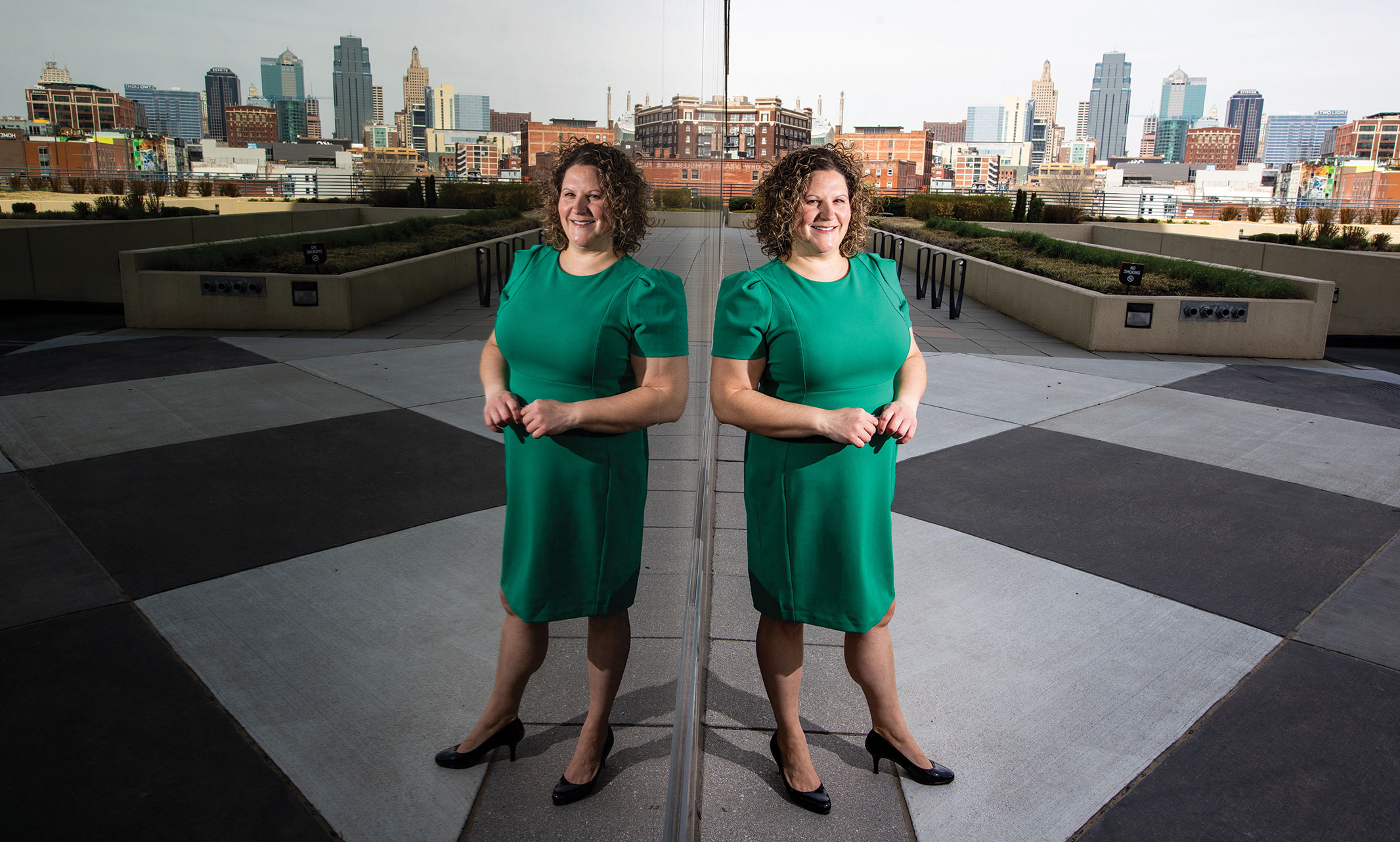
Associate city prosecutor adds significant volunteer work to demanding job and single parenthood
A mentor’s suggestion sent Jesse Sendejas (B.L.A. ’03, J.D. ’05) on the road to law school and a career dedicated to criminal justice in Kansas City, Missouri. Despite her demanding schedule, she finds time to volunteer in the community.
Sendejas worked at a doctors’ office during her first couple years of college at UMKC. When the practice split, she spent time with the attorneys who worked on the establishment of one of the doctor’s new practice. While observing Sendejas’s interaction with the team, her boss suggested her future career path.
“She asked me what I was planning to do, and I said I was interested in business,” Sendejas said. “She said, ‘I think law school would be a good idea for you.’ Even though I knew I wanted to go to college because I wanted a career, I didn’t know anyone personally who was an attorney growing up. But after her suggestion, I hit the ground running. Within six months I had taken the LSAT.”
Following graduation, Sendejas pursued civic work. Over time, she joined the Kansas City Prosecutor’s office. Shortly after, she began to pursue volunteer opportunities.
“After I started my permanent position with the City of Kansas City, I wanted to do more volunteering in the community, so I started volunteering at Big Brothers and Big Sisters of Kansas City and the Kansas City Metropolitan Bar Association Young Lawyer's Section, Public Service Committee.”
Her volunteer work with Big Brothers and Big Sisters led to a long-term relationship with her Little Sister, Jasmine, who is now an adult. Sendejas was a critical component of emotional and physical support of Jasmine through high school, including taking her to school when Jasmine’s mother was unavailable. She helped Jasmine apply and get accepted to college.
“Based on my experiences as a first-gen law student, I remembered how hard it was to do all of that alone and not know what resources were available. Probably subconsciously, that is why I have always wanted to mentor kids. I’ve seen the positive impact just a little encouragement can do. I wanted Jasmine to know that she could go to college – and a college away from home.”
The two are still in touch, even though Jasmine is in her early twenties.
Her volunteer work with the KCMBA has been equally rewarding.
“I volunteered and attended meetings for a few years until I became the co-vice chair of the committee. Then I worked my way up in the KCMBA leadership.”
Over the years, she’s found that KCMBA makes valuable contributions to the community, as well as connecting attorneys from all practice areas, and working for justice in the legal system.
“I think all of that is important to promote and be involved in,” she said. “In addition, being able to connect with attorneys I otherwise wouldn't have the opportunity to has really helped me both in my career and on a personal level.”
Recently, she has collaborated with other KCMBA members at large at the board’s annual, “Board Forward.”
“Board Forward is our annual board meeting. We don’t ‘retreat.’ We move forward,” she said. “This year we worked with different sections of the organization to see if proposed ideas were feasible. And, if they were, how we could make them happen.”
One proposed project was to see if the organization could provide free first year memberships for recent law school graduates.
“We were able to make this happen for first year graduates by restructuring fees for all members.”
Outcomes like this are satisfying and keep Sendejas involved despite her busy schedule as a single parent.
“Being an attorney is hard work and at times extremely stressful, so being able to step away from that stress and see the joy you can bring to others is so fulfilling. And now that I am a single mother, I want to be a good example for my son and hope he will do the same one day.”
Sendejas loves Kansas City and being able to make a difference has always provided her joy.
“I like the collaborative work that we do here,” she says. “I like helping people figure out the solutions to their problems and get back on track. It’s always interesting, because every person is different in the challenges they’re facing and what they need to address them.”
There are days when Sendejas is frustrated with a case’s outcome, but she has confidence in the system. Her relationships with her colleagues often provide insight.
“Our judges are thoughtful and willing to share their perspectives. I’ve been in the prosecutor’s office for more than ten years, so I’ve established good relationships. It’s helpful for me to understand their process.”
The job is demanding, and there are times when there is more need than the time to address it. But Sendejas’s commitment is significant.
“I love my job,” she says. “It’s very demanding, and we have a lot of cases going on at all times, but there is reward at the end of each case knowing that you’ve helped someone. It may be the defendant or the victim – or both – but to help someone get on the right path and seeing that kind of work through to the finale and making sure justice is served is satisfying.”
She is aware that defense attorneys may hear more success stories and receive client appreciation, but she does hear success stories.
“A lot of people just make mistakes, like getting too many traffic tickets, and these are not reasons to ruin someone’s career or impede their ability to get a job. There needs to be consequences, but it’s not necessary to ruin their whole life.
Sometimes I get a call from a victim letting me know that the process was helpful for them, or that their concerns were addressed. That is the most rewarding feedback.”
Jun 30, 2022
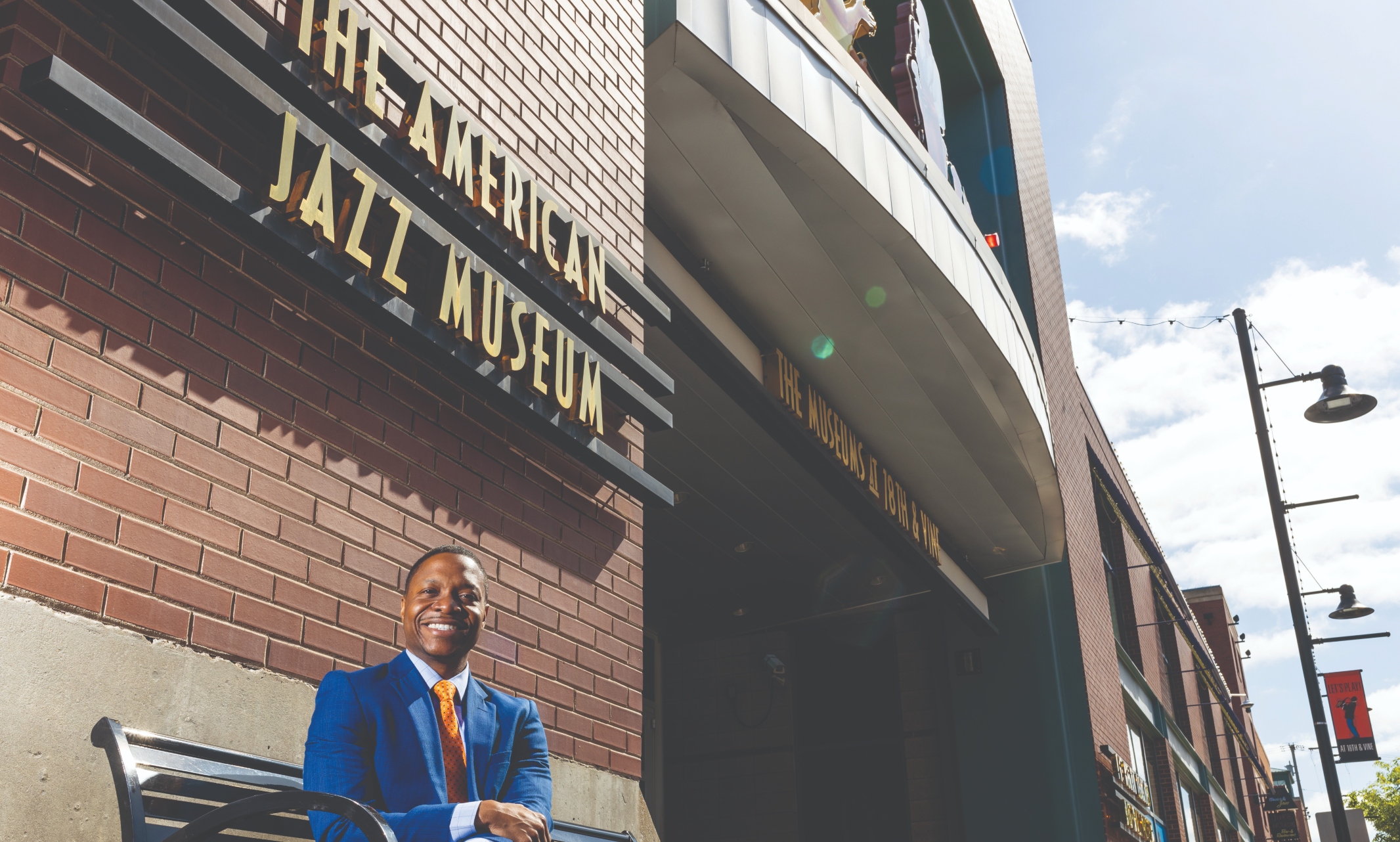
Attorney Shaun Stallworth found his calling advocating for underrepresented law students and plaintiffs
Shaun Stallworth’s (J.D. ’08) passion for advocacy developed partially out of the discomfort he sometimes felt as one of only four people of color in his first-year class of nearly 200 students at the UMKC School of Law. “I don't know if some folks realize that's a big deal until you walk in those shoes as a first year, with all the other stress you're dealing with,” Stallworth said. “And then add on that you're the only person of color — that's tough.” Although he said he has many fond memories of law school and wouldn’t trade his experience for anything, Stallworth recognizes that his experience may have been atypical. “I'm used to being in places where I may be the only person of color — maybe one of two or three,” he explained. “I've been blessed to have a ton of Black friends, white friends, friends of different colors. But at the same time, it always is still something that is unique to you, when you're one of only a few or the only one. I didn't have a bad experience, but it's different when you're the ‘other than’ in the room.” That feeling of being “other than” can be especially prevalent among students like Stallworth, who are the first in their family to attend law school. Many of these first-generation law students belong to racial minority groups, which often adds an additional layer of challenge to their educational journey. Those challenges they face don’t simply disappear the moment they arrive on campus. Stallworth remembers feeling a unique pressure in the classroom environment at times, for example, when discussing historic segregation cases. “When there's a question that kind of touches on the race thing, your friends and classmates look to you to be the monolith for all things Black,” Stallworth said. “Even though I don't mind expressing my opinion, that's some additional stress that maybe some others don't have.” Stallworth’s experience led him to begin his enduring work of breaking down the barriers that cause people to feel excluded, marginalized or “other than.” During his third year of law school, Stallworth served as president of the Black Law Students Association. Frustrated by the lack of diversity he had noticed within the law school, Stallworth decided to take action. He contacted leaders of the Hispanic Law Students Association and Asian American Law Students Association to discuss solutions to attract and support students of color. Stallworth led the small group of student leaders in planning a banquet at the Kansas City Marriott Country Club Plaza, raising an impressive $30,000 and establishing the first Pipeline Scholarship at the UMKC School of Law. Stallworth said he takes pride in having initiated the annual student-run scholarship that helped create opportunities specifically for individuals of color. “Being the leader of that effort definitely meant and means a lot to me,” he said. “To be able to give scholarship money back to other students who look like you and get more people in that position to see more (similar) faces in the classroom — that was something special to me.” The complex issues of inclusion and representation persist within higher education, but Stallworth said he applauds the law school for making concerted efforts to increase diversity over the years. Those efforts include the formation of a new alumni diversity committee and the Ellen Y. Suni Opening Doors Scholarship Endowment to support a first-generation law student each year. “I think efforts in the school have been so committed to this,” said Stallworth. “I'm currently on the UMKC Law School Alumni Board, so I can certainly attest to the efforts that (former) Dean Suni and Dean Glesner Fines have made. They’re doing some great things with the students.”
A native of Slidell, Louisiana, Stallworth grew up surrounded by the rich sights, smells, tastes and sounds of a region that is world-renowned for its cross-cultural and multilingual heritage. “I always tell people I’m extremely blessed that I got the best of both worlds,” Stallworth said. “On one hand, I grew up in the suburbs of New Orleans, so I was able to go to some of the better schools in one of the better parishes in a state not known for its education. At the same time, I was close enough to be able to partake of everything that was part of that Southeast Louisiana culture.” Stallworth and his parents, a teacher and a computer programmer, lived only about 30 minutes away from Bourbon Street. But they were far enough away from the urban core to allow Stallworth to have plenty of what he calls “Tom Sawyer moments” — jumping off train trestles into the Mississippi River and swinging on tires suspended by ropes while alligators lurked below. Stallworth remained in Louisiana while earning his undergraduate degree in communications with minors in French and business administration at LSU. A few years before Stallworth applied to law school, his mother suffered a medical malpractice ordeal that would shape her son’s future career path. She injured her back in an accidental fall and needed surgery to repair the damaged disc. Unfortunately, the surgeons left pieces of sponge in her back, where they remained for nearly two months causing infections and other complications throughout her entire body. Watching his mother suffer so much through no fault of her own was a “big jolt” to Stallworth that sparked his initial interest into becoming an attorney. “I always thought that was kind of messed up what happened to a regular person like my mother, who works hard and does what she needs to do,” he said. That experience led Stallworth to pursue a law degree and become the first lawyer in his family. Years later, Stallworth, currently working as of counsel with Holman Schiavone, LLC, has built a successful law practice seeking justice for individuals who, like his mother, have been wronged in some way and need assistance. It took some time for Stallworth to settle into his niche within the legal profession. Throughout law school at UMKC, Stallworth clerked with the large international firm Sonnenschein Nath Rosenthal, LLP (now Dentons US LLP) and briefly with the Missouri Court of Appeals. At that time, Stallworth considered becoming a prosecutor. Then, as Stallworth’s studies were winding down, Sonnenschein presented him with a profitable opportunity he couldn’t refuse. “They certainly were offering more money than I had ever made before, or my parents had ever made, so I took the opportunity to go to do big law,” Stallworth said. Over the course of the next five years — from 2008 to 2013 — he represented large companies like Walmart, Lowe's, Sam’s Club and Harris Bank. While lucrative, the dense nature of large commercial litigation didn’t hold Stallworth’s interest for long. He became captivated by the stories fellow UMKC School of Law alumnus Tom Ralston (J.D. ’08) shared with him during their workout sessions at the gym. “He'd always have these great stories about doing employment law,” Stallworth said. “And he told me this really interesting story about what happened in this case and that case. And I thought, ‘Man, that seemed like so much fun.’ ” When Stallworth eventually met Ralston’s colleague Kirk Holman (J.D. ’99) at an Inns of Court event in 2012, the two struck up a spirited conversation about plaintiff work and bonded over similarities in their upbringings. Holman, known as one of the most well-respected plaintiff attorneys in the region, inspired Stallworth to seriously consider making a career change. “(Holman) had a lot of passion for what he was doing, and that mattered to me,” Stallworth said. Months later, Stallworth met with Anne Schiavone (J.D. ’99), Holman’s partner at the firm. Schiavone convinced him that he could do more enjoyable, less stressful work without sacrificing the kind of income he earned at the large defense firm. That leap of faith to the opposite end of the legal spectrum paid off for Stallworth. The supportive, collaborative environment at Holman Schiavone, a firm made up almost exclusively of UMKC School of Law graduates, has allowed Stallworth to thrive while finding greater purpose in his work. “On the plaintiff side, it's a lot of emotion, a lot of times, because this is someone that feels like they've been wronged — they've been treated differently — on the basis of their race, their sex, their age, their gender, whatever,” Stallworth said. “Sometimes you get a really good result of potentially, if used correctly, life-changing money for some people. You're able to take something that was a really bad event that happened in their life that they’d probably rather forget about, and then get them some type of compensation — something that will help them push past that particular point in their life.” His positive energy and willingness to take on cases other attorneys reject sets Stallworth apart in the eyes of his clients. He once represented a Black man alleging race discrimination and retaliation in a lengthy case against a casino. Overcome with gratitude, Stallworth’s client broke down crying when the resolution finally came down in his favor. “He said, ‘This has just been so stressful for me and my family. I feel like I lost my I lost my livelihood for a company I've been with for 15 years. You got me here. You stuck with me, and I appreciate that. God bless.’” His client’s emotional reaction touched Stallworth deeply. “That was something right there,” Stallworth said. “That was coming from his soul, so that meant a lot. I've had a number of those reactions over the years, and it's something that I'm always appreciative of. I don't take that lightly for someone to put their emotions and their feelings on their sleeve like that.” Nearly two decades later, Stallworth remains dedicated to the objective he established as a student at the UMKC School of Law — increasing diversity within the legal profession. Past president of Jackson County Bar Association, one of the oldest African American bar associations in the country, Stallworth remains actively involved in community enrichment efforts by mentoring potential law students, fundraising for scholarships and conducting legal writing workshops. Knowing he may have contributed to somebody's professional success brings Stallworth immeasurable joy. “I've been able to stay in touch with potential law students that have gone on to become law students, and then gone on to become lawyers,” Stallworth said. “And that's been really cool to see.”
Jun 30, 2022
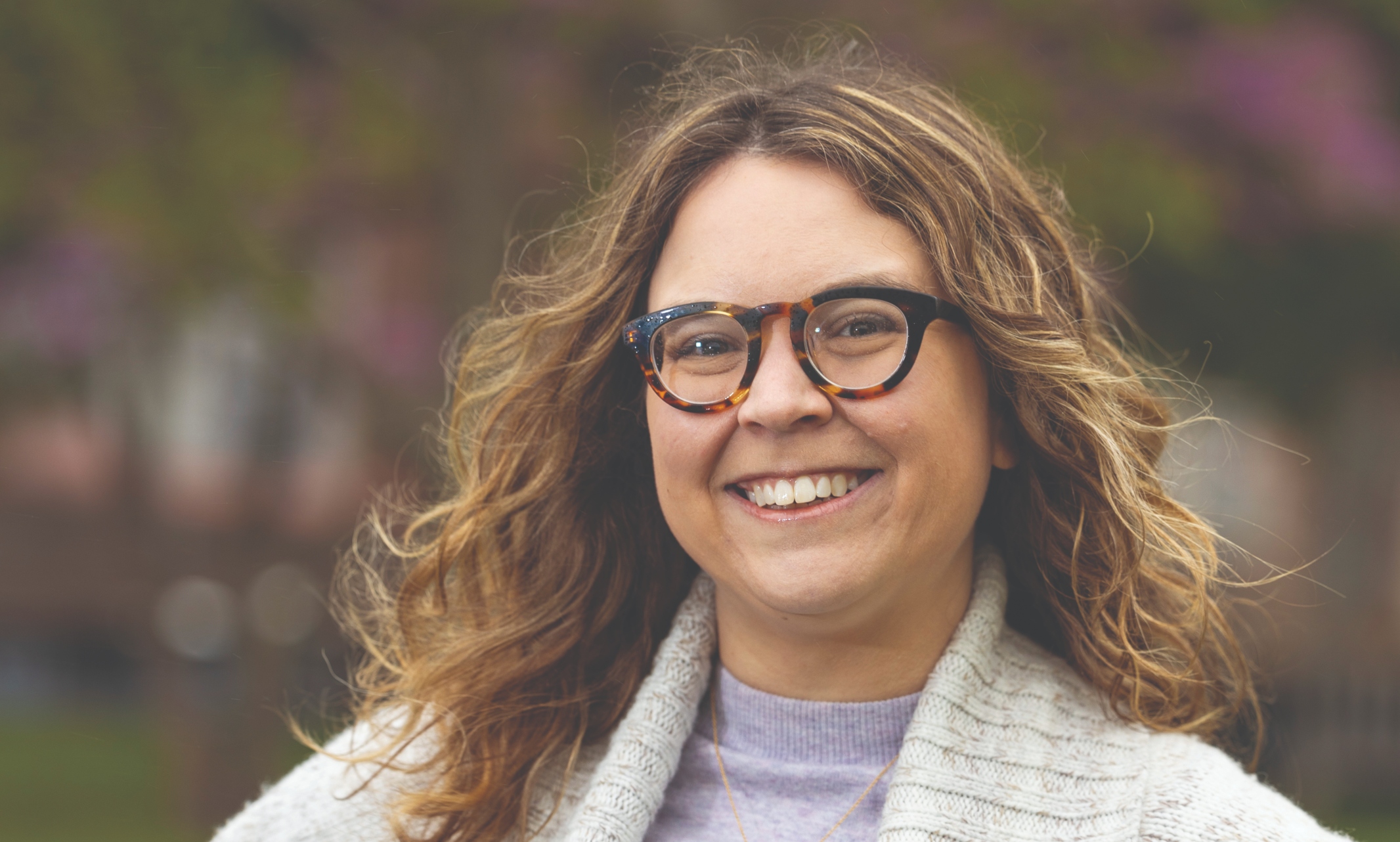
UMKC Law Foundation executive director Marie Dispenza helps position students to succeed by increasing their access to financial support
Marie Dispenza, J.D. ('05), enrolled in law school with the dream of becoming an entertainment lawyer – but now enjoys helping law students achieve their dreams through philanthropy and mentoring. “I had no idea what it took to become an entertainment lawyer,” Dispenza said. “I knew about networking, but I didn't know how to do it. I just didn't know what I was doing.” Instead of practicing law, Dispenza found a new calling close to home. “I am kind of a do-gooder deep down,” Dispenza said. “That is what ultimately led to me to the non-profit sector.” Dispenza found the most value in the personal connections made at UMKC. Many School of Law alumni with practices nearby are willing to mentor the next generation. It’s a tight-knit community in the big city. She didn’t need legacy connections to build her success. She could build them with the help of the UMKC family. “Whether I actually know someone, or someone who can introduce me, it's very helpful in fundraising activities simply because relationship building is so important,” she said. Dispenza returned to her alma mater in 2020 as the director of major gifts and now also executive director for the UMKC Law Foundation. She saw first-hand that additional resources and support are necessary for students to be positioned to succeed, and she is determined to make sure UMKC students, especially first-generation students, have access to both. “People often come to law school because they want to make a difference,” Dispenza said. “I want to support the person who wants to do good work but maybe doesn't come from a privileged family or one with a legacy in the legal community.” Barbara Glesner Fines, dean of the law school, was one of Dispenza’s professors when she was a student. Both expressed joy at the opportunity to work together again. "Marie is leading the law school’s effort to expand scholarships that open the doors to a legal education, especially for the nearly one-third of our students who are first-generation college graduates. For our many students who dedicate their careers to public service, these scholarships permit them to follow that career path free of crushing student loan debt,” said Glesner Fines. “Marie’s talent and passion is engaging donors and volunteers to realize their own visions for making our community more compassionate and inclusive.” Even all this time after earning her law degree, Dispenza still has her sights set high. She wants to see the non-profit sector flourish and innovate to see greater gains for their causes. She’s excited to continue with the Law Foundation to bring a diverse group of difference-making lawyers into the fold. “I think that it's really important to me to be a part of changing that narrative — to build foundations for nonprofits that need a little bit more stability and efficiency,” she said. “Tying up loose business ends like that is the boring stuff that nobody really wants to talk about, but that is what jazzes me up.”
Jun 30, 2022
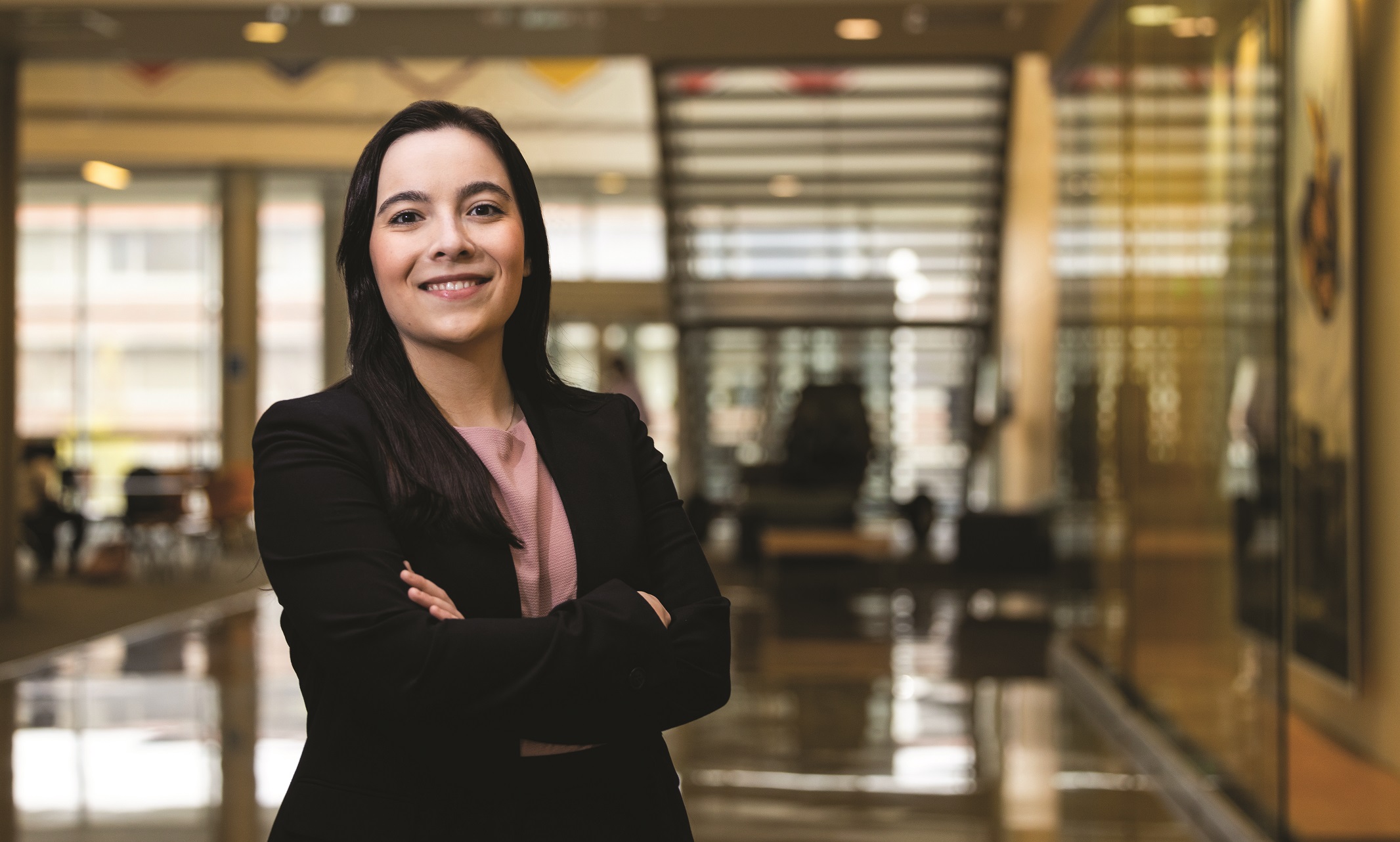
First-generation law student Kylee Gomez found her niche in helping people find rehabilitation and second chances
Kylee Gomez found her niche in the UMKC School of Law helping people who have faced criminal charges find second chances.
It was a natural fit for a law student who earned a double major as an undergrad in criminal justice/criminology and political science.
“Like many Americans, I have loved ones who have struggled with substance abuse disorder,” said Gomez. “I care about individuals that have been through the criminal justice system and others that were close to it. I believe our system should give second chances and provide better opportunities for rehabilitation.”
As an undergraduate, Gomez volunteered with local organizations focused on criminal justice reform and rehabilitation. One of those volunteer opportunities was the School of Law’s Clear My Record Project. Gomez points out that for many in Missouri with criminal records, their convictions have become “the punishment that never ends.” Despite having fully paid their debt to society, they find the impact of their record lingers, blocking educational, employment and housing opportunities. The persistence of criminal records also takes a heavy toll on a person’s health.
She volunteered for the Clear My Record project and then was given permission to enroll in the Law, Tech and Public Policy law school course in order to help lead the project.
“My interactions with the law school faculty and staff during the Clear My Record Project are what really encouraged me to apply for UMKC’s law school,” said Gomez. “As a first-generation student, the decision to pursue a professional degree was nerve-wracking because no one in my family had that experience. However, my family's support and the guidance I received from my UMKC professors made the process easier.”
Gomez now works with clients at the UMKC Law Expungement Clinic – which developed out of the 2019 Clear My Record Project.
“I have a passion for public interest law and public policy and want to establish my career aiding in the expansion of equal justice for all,” said Gomez. “The expungement clinic gives me the opportunity to do that, while helping those right here in the Kansas City community.”
Individuals may request the sealing of criminal records under Missouri’s expungement law, but the process is complex and expensive. As a result, only 125 individuals were able to expunge their criminal records in 2019, despite the fact that an estimated 1.3-1.8 million Missourians possess criminal records. According to a recent study of a similar jurisdiction, the expungement process is so complex that only 6.5% of people eligible for record clearance actually filed petitions. The benefit of expungement is profound. Once expungement is granted, an individual may truthfully answer “no” to questions seeking information about the existence of prior eligible convictions, including housing and employment applications.
“As a first-generation student, the decision to pursue a professional degree was nerve-wracking because no one in my family had that experience. However, my family's support and the guidance I received from my UMKC professors made the process easier.” — Kylee Gomez
Gomez, about to enter her third year of law school, is a first-generation student. Resources on campus and volunteer opportunities helped her find her path in school.
“Like many other first-gen students, I navigated my own way through higher education,” said Gomez. “The resources on campus, especially peer mentorship, career services and academic advising, were extremely helpful. My family supported me but couldn’t always guide me through the process of being a college student.”
In addition to working at the expungement clinic, Gomez is a student emissary, teaching assistant and UMKC Law Review comment editor.
Gomez’s ability to, not only balance her various responsibilities, but also excel at them, caught the eye of Professor Wanda Temm.
“Kylee was a student in my first-year Lawyering Skills course. She received the Joseph E. Stevens Memorial Prize, given to the top first-year student who shows the most promise in legal writing,” said Temm. “Some years, we agonize over the decision of whom to select. Not that year. Kylee was a unanimous choice.”
After having her in class, Temm encouraged Gomez to apply to be a teaching assistant. She says Gomez possesses all the right characteristics – maturity, good judgment, a calm demeanor, the ability to relate to others, patience and willingness to work hard.
“Helping other students begin their legal writing journey has been a really rewarding experience,” said Gomez.
Temm’s Lawyering Skills class isn’t the first experience Gomez has as a teaching assistant; she helped construct and teach an LSAT prep class with Dean Barbara Glesner Fines.
“Given that my last exposure to the LSAT was decades earlier, I knew I needed a teaching assistant to help,” said Glesner Fines. “I needed a student who did well on the LSAT and could help me find ways to prepare other students to do the same. I asked admissions, career services staff, fellow faculty members and administrators for recommendations. They all recommended Kylee.”
Gomez’s work for the LSAT prep class and her work as a student emissary are both focused on helping other students learn about law school, and the UMKC School of Law in particular. Student emissaries and the UMKC law school admissions team were an important part of her journey.
“I got to know Kylee during the Clear My Record project and the law school admissions process,” said Lauren Butler, director of admissions at the School of Law. “I could see how excited she was about the project and the possibility of law school. She has a passion for helping people, and I have no doubt that excitement will follow her into her legal practice.”
So, what does Gomez envision for her future?
“I’m hoping to clerk for a judge after I graduate," Gomez said. "I think clerking is the best way to gain mentorship and continue my legal writing and advocacy capabilities before entering practice.”
Jun 30, 2022
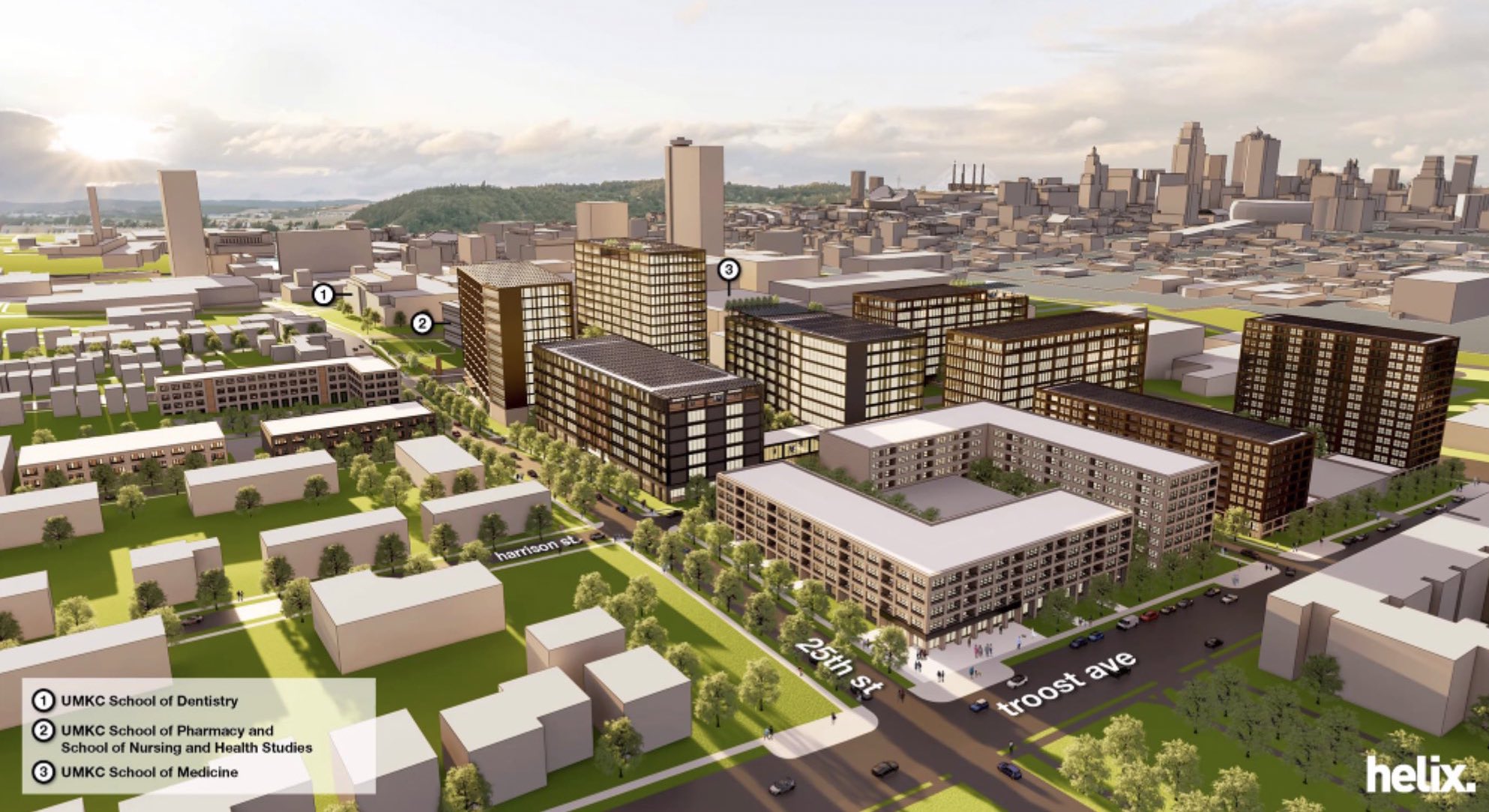
New multi-story building will expand classrooms and teaching clinics, spur research and development
The University of Missouri-Kansas City is poised to begin work on a new interprofessional health sciences building in the UMKC Health Sciences District, housing new, state-of-the-art dental teaching clinics and expanded medical school teaching facilities.
The multi-story, $100 million project also will serve as a home for the university’s Data Science and Analytics Innovation Center and Biomedical Engineering program. This project will take the Health Sciences District to the next level, accelerating health care access and equity for the community and sparking development to turn the campus into a regional draw, igniting entrepreneurship and economic growth for the city and region.
The state of Missouri has appropriated $40 million for the building in legislation signed by Gov. Mike Parson on July 1. This appropriation comes with a challenge to the Kansas City community to raise the additional $60 million to build the $100 million project.
The project has broad and enthusiastic support from the City of Kansas City, Jackson County and multiple business, civic and economic development organizations. The project will add impact and momentum to the burgeoning growth underway in the district – including recent additions such as Children’s Mercy Kansas City’s $200 million Research Institute tower, the $70 million University Health 2 medical office building and the $45 million University Health 1 building.
Civic leaders view the UMKC project as a next step toward the launch of a comprehensive development plan for the district.
“A united medical and dental building will be a signature facility, as there is only one such institution in the country with this combined learning and clinical environment,” said Chancellor Mauli Agrawal. “The project will spark an expansion of the entire UMKC Health Sciences District that could dramatically expand health care in Kansas City, attract top faculty and researchers and new private investment that could create new jobs and eventually contribute billions to the Kansas City economy.”
Academic medical centers in San Antonio, Memphis and Denver, among others across the country, have transformed districts with an estimated multibillion regional economic impact annually.
Additionally, an interprofessional health building allows for increased collaboration among health care fields, which creates a greater capacity for developing health solutions and providing patient care. UMKC is one of only 20 universities in the country where dentistry, medicine, nursing and health studies, and pharmacy share a single, walkable campus, which underscores the need to continue to provide opportunities for collaboration among the health sciences.
UMKC will occupy the first several floors of the project and additional floors may be available to public partners for medical office space, clinical space and other uses. Here’s what will be housed in the UMKC space:
School of Dentistry
These state-of-the-art clinics will attract some of the best students and faculty from the region, making UMKC competitive with top schools across the country. In addition, UMKC will have increased space to continue its important work in serving the underserved – delivering almost $1 million in uncompensated care to those who otherwise might not get treatment. With a new interprofessional medical building, the next generation of dentists can be taught to deliver better dental care at a lower cost. Another benefit will be the expansion of dental emergency services, which will lower the number of dental emergencies seen at hospital emergency rooms and continue to make first-rate dental care more accessible to the community.
School of Medicine
The new building will provide state of the art educational facilities for UMKC medical students and programs, such as space for more simulation labs, which lead to better training for students and better care for the community. The expansion also will allow for necessary infrastructure changes to improve the school, including increased capacity for digitization with additional space for fiberoptic cables, improved air flow throughout the building and expanded classroom space.
Biomedical Engineering
Proximity between doctors and developers of medical devices is paramount, and this new building will foster faster, more effective collaboration between engineers and medical professionals to accelerate product development in areas such as imaging technology, implants and microsurgery tools. UMKC will expand its ability for creating new technology, generating innovations for products and patents with the potential to work with companies to develop and produce them.
Data Science and Analytics Innovation Center
Through its expertise in data science, UMKC and its clinical partners are ushering forward a new era of personalized health care — one that will treat diseases based on individual variability in genes, environment and lifestyle, rather than a traditional one-size-fits-all approach. The data center’s work will drive innovation in a variety of domains, ranging from health care and business intelligence to agriculture and digital humanities.
Jun 30, 2022
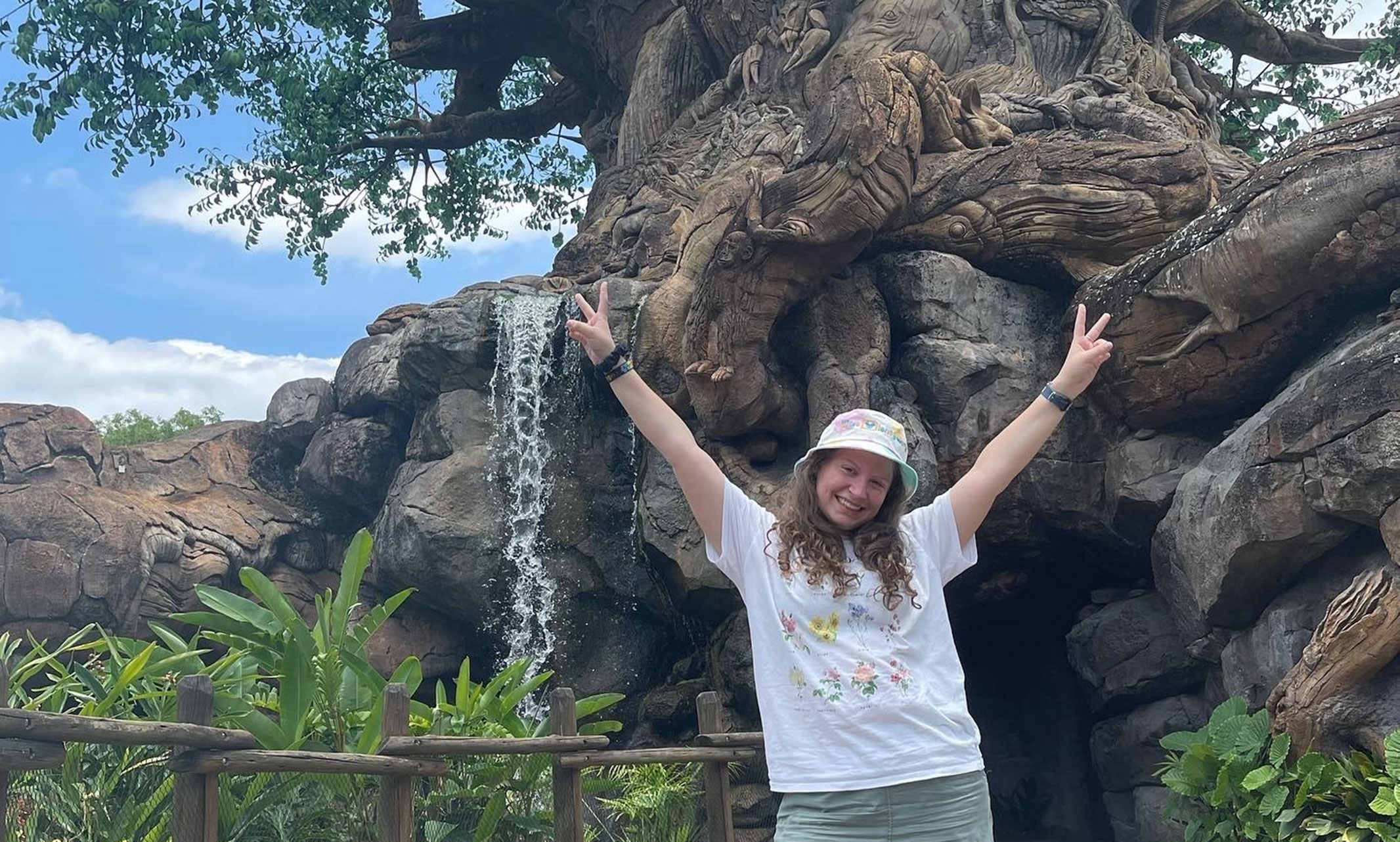
Psychology student makes magic with her internship
Alyssa Schulz (’25) wanted to participate in an internship while she was studying psychology and criminal justice at UMKC. That’s when she decided “I’m going to Disney World!”
The Disney College Program offers a variety of employment and learning opportunities for college students from across the country. These students are still called “cast members,” like everyone else who works for the Walt Disney Company. Schulz was accepted for the Fall Advantage program in a merchandise role at the Port Orleans Riverside resort, which means she will work with the company from May until January. Schulz sat down with us to share some of the magic she gets to experience as a Disney College Program cast member.
What gave you the idea to apply for the Disney College Program?
I heard about it first at one of my jobs. Someone said they had applied, but it was during COVID. The program got canceled that year, but that's when I first heard about it. At my other job, my managers used to work at the Disney Store near me, and they knew about it. That’s when I really looked into it because it sounded so fun. I thought you had to live in Orlando already and work there forever. When I found out I could just be there for seven months, it seemed really cool.
Looking ahead, what are you hoping to get out of your program?
I’ve found out I really want a career in hospitality. Disney is a big company, and I’d love to continue in it. Working at the resorts is so chill and fun, so I’d love to stay on that path after I get my degree.
What would you say your time at UMKC has done to prepare you for an opportunity like this?
I think UMKC is such an inclusive university. I've seen so many different types of people, and all the professors are very open to whoever, and so is Disney. I know UMKC encourages students to do internships, and I even talked with the chair of the psychology department while I was applying. Even though it doesn't technically align with my major, she was so excited for me. Everyone's so kind and supportive, and I'm grateful about that.
What is your favorite part about working at Disney World?
I love interacting with so many different people from all around the world. And again, it's a very inclusive company. Those two things mean a lot to me: meeting new people and being very inclusive.
What's your favorite part of going to the theme parks?
I love the rides. The new Guardians of the Galaxy roller coaster in Epcot is amazing. Rise of the Resistance in Hollywood Studios is a good one. Also, the Peter Pan ride in Magic Kingdom is a classic.
Jun 29, 2022
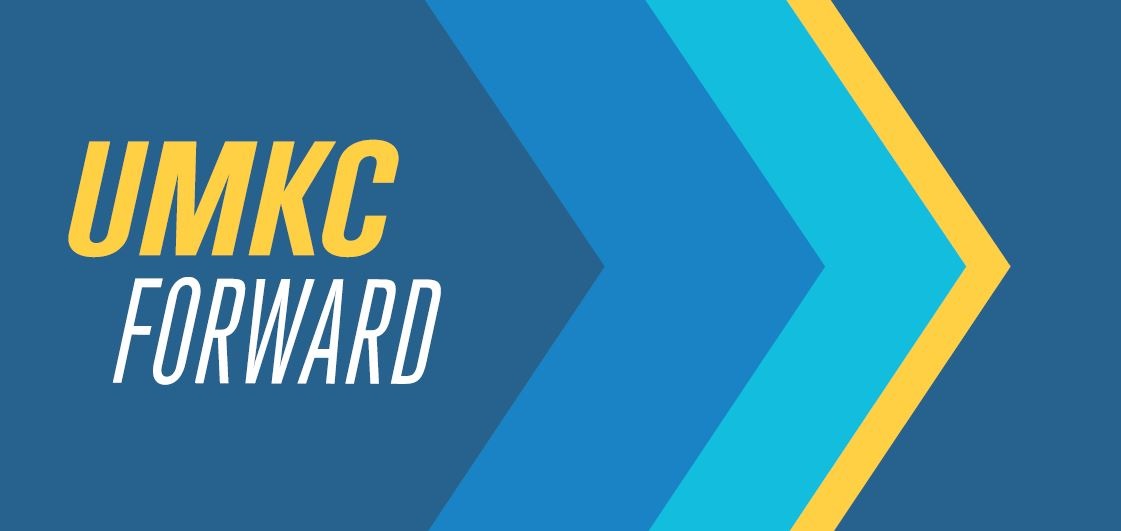
Schools and departments realign for stronger future
The UMKC Forward academic realignment, designed to optimize resources and better serve UMKC students and community, will begin on July 1. Significant progress on hiring and program development have laid the groundwork for collaborative research and student success.
In 2020, during the early days of the COVID-19 pandemic, Chancellor Mauli Agrawal announced the formation of UMKC Forward, a collaboration of faculty, staff and students across the university that would develop a new vision for the university’s future. Part of that vision was a realignment of the academic units at UMKC in order to optimize the strengths of the university and the opportunities for students’ career achievement. The official launch of the academic units begins this summer.
Kevin Truman, Ph.D.
The School of Science and Engineering (SSE) will include the divisions of Biological and Biomedical Systems; Computing, Analytics and Mathematics; Energy, Matter and Systems; and Natural and Built Environments. Kevin Truman, current dean of the School of Computing and Engineering, will take the role of dean of SSE.
“We are already seeing significant effects on faculty recruitment and collaborative research as a result of the new structure of SSE,” Truman says. “In addition, our current faculty are forming partnerships across department lines. While this is exciting, the expanded opportunity for our students is limitless.”
Tamara Falicov, Ph.D.
The School of Humanities and Social Sciences (SHSS) will include the departments of Media, Art and Design; Communication and Journalism; English Language and Literature; Foreign Languages and Literatures; History; Sociology and Anthropology; Economics; Political Science and Philosophy; Race, Ethnic and Gender Studies; and Criminal Justice and Criminology.
The SHSS inaugural dean is Tamara L. Falicov, who previously served as associate dean in Arts, Humanities and Area Studies in the College of Liberal Arts and Sciences at the University of Kansas, where she was also a professor in the Department of Film and Media Studies and the Center of Latin American and Caribbean Studies. She will begin work at the School of Humanities and Social Sciences on Aug. 1.
“The focus on undergraduate research at UMKC was a critical component in my decision to pursue the position of dean of SHSS,” Falicov says. “We will continue to expand opportunities for student research in the humanities, social sciences and the arts and amplify the message that the study of human history and experience is critical to our future.”
The School of Education, Social Work and Psychological Sciences (SESWPS) will include the departments of Education Leadership Policy and Foundations, Teacher Education and Curriculum Studies, Social Work Counseling and Counseling Psychology, and Psychology. Carolyn Barber will continue as interim dean for the upcoming academic year while a national search for a new dean is conducted.
Carolyn Barber, Ph.D.
“Through the creation of SESWPS, we are strengthening existing connections among programs committed to supporting the development and well-being of individuals across the life span,” Barber says. “By effectively addressing the social and educational needs of our communities through teaching, research and practice, our new school will have a broad, long term impact that will span across generations.”
Existing units that will remain unchanged are the Henry W. Bloch School of Management, Conservatory, School of Dentistry, School of Law, School of Medicine, School of Nursing and Health Sciences and the School of Pharmacy.
“After months of planning we are excited to see UMKC Forward energize our community,” Mauli Agrawal, UMKC chancellor says. “This is the beginning of a new generation of Roos, who will be immersed in exposure to different disciplines and a new philosophy on what a college education is. It will change the way our students think, the way they act and accelerate their potential in a new era of problem-solving as we emerge from the changes of the past two years.”
Jun 28, 2022
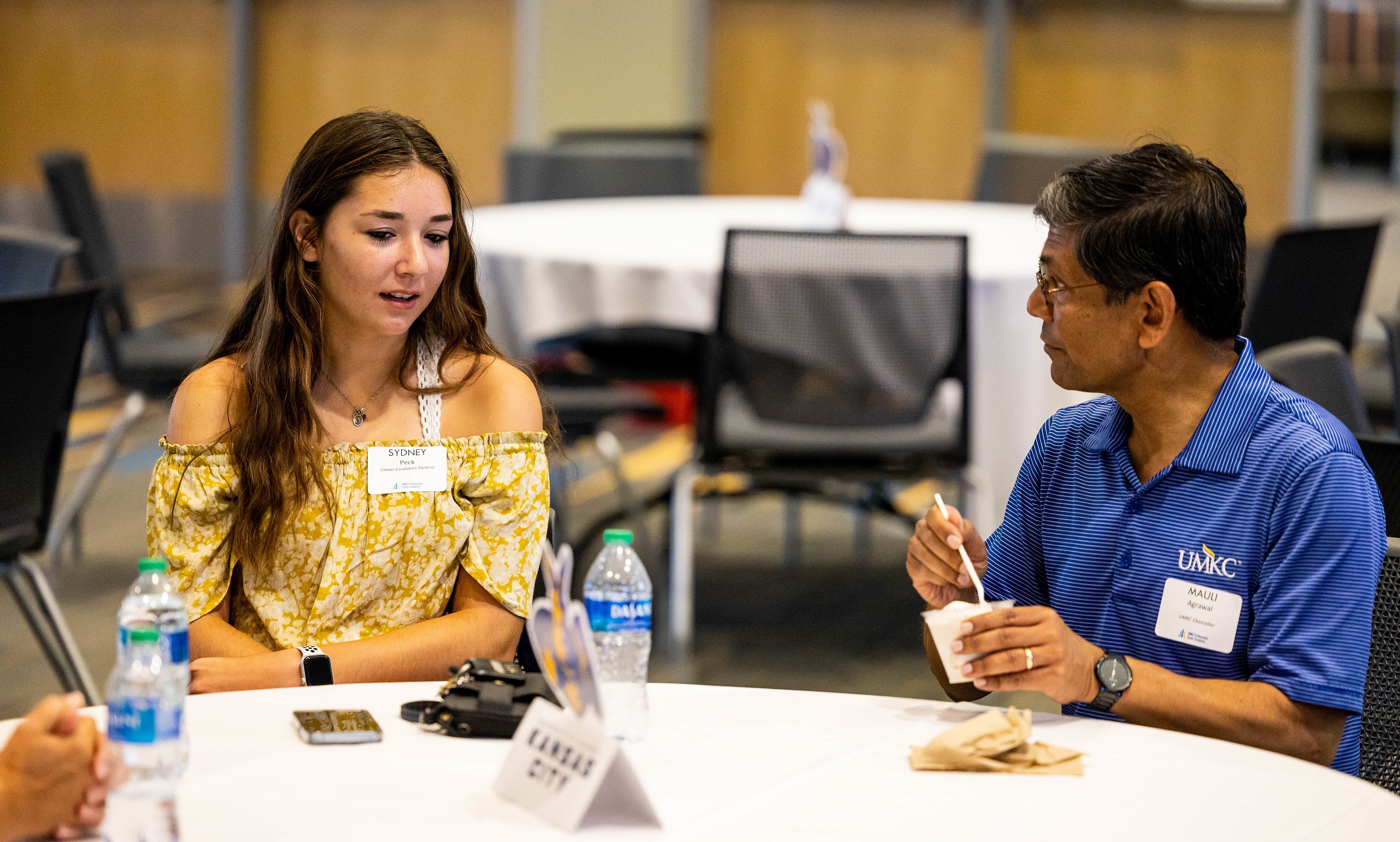
UMKC welcomed students from the first Escalators cohort to campus
UMKC’s new initiative, Professional Career Escalators, kicked off last Saturday with an ice cream social and welcome event.
Students in the inaugural cohort were invited to campus to get to know each other and meet community members, faculty and staff they’ll engage with during the program. Betty Rae’s ice cream truck provided sweet treats.
“We’re so excited to finally kick off the first year of the Professional Career Escalators program,” said Mako Miller, director of the program. “We’re helping students bridge the gap between academics and the professional world. They’ll have a better understanding of life after graduation and what they want to do with their careers.”
The signature Professional Career Escalators program is a unique, trademarked system of personalized support and services unlike anything being offered across the U.S. It is designed to propel students from their academic studies to good-paying careers by providing a dedicated, GPS-guided path from enrollment to workforce. The program involves mentors from local business and organizations, internships, networking and employment preparation in key areas of workforce demand: health care, engineering, business, education and law and justice.
There are 100 students in this cohort, all of whom will begin their time at UMKC this fall as first-time freshmen or transfer students. Through the Escalators program, they’ll have opportunities to explore their interests through applied learning experiences and mentoring, as well as develop their career and leadership skills.
We asked some of these students what attracted them to the Professional Career Escalators program.
Michael Viermann, second from right
Michael Viermann, Raymore-Peculiar High School: “I saw the big headlines that said $1,500 scholarship. Money is always an issue. I want to be a doctor, which is a little scary, and I thought the program would help me. And my brother goes here, and I love Pizza 51.”
Aaliyah Daniels, left, and friend.
Aaliyah Daniels, Sumner Academy High School: “I saw that there was a law and justice option and I want to learn more about that, for when I go out into the community to help people.”
Paris Yates
Paris Yates, Hermitage High School: “I liked the health care aspect. I think it can help me with communications skills and leadership skills, and help my career path.”
Dunia Qakei, far right
Dunia Qakei, Lee’s Summit High School: “I saw the information about the escalators on my application status page, and I feel like I could fit in. I’m excited for the applied learning experiences.”
Lily Lefferd, left, with her mom Rhonda
Lily Lefferd, Royal Valley High School: “I like the idea of getting the opportunity to explore internships while I’m in college for business administration.”
Sydney Peck, far right, with her family
Sydney Peck, Staley High School: “I am very involved in music and I am interested in health care as a career. I like that UMKC has joint research with the Conservatory and School of Medicine.”
Jun 28, 2022
The young professionals are all from different schools at UMKC
Juliana Alvey, a graduate student at the University of Missouri-Kansas City, Myles Howell (MBA '14) and John McGurk (JD '06) have all been named to the Kansas City Business Journal's 2022 Class of NextGen Leaders.
The NextGen Leaders Awards honor 25 rising stars in the Kansas City business community. Winners are selected by a panel of six judges.
Alvey manages internal and external communications for CBIZ's employee benefits division.
McGurk is the vice president of development at Milhaus Kansas City, a development and construction company. Howell is the owner and vice president of strategy for Bardavon Health Innovations Inc., a workers' compensation digital health partner.
To read more about the leaders, click here.
Jun 27, 2022
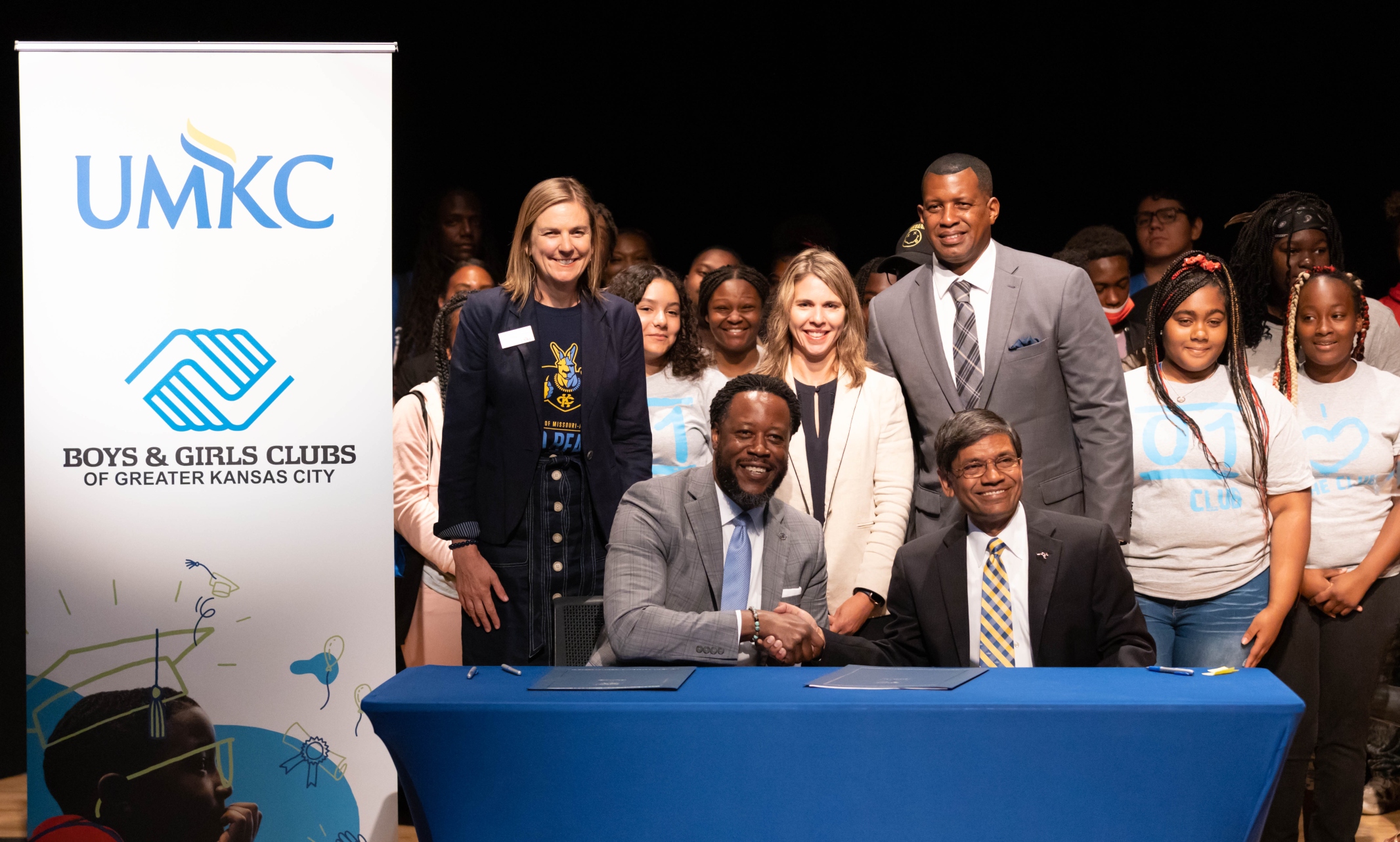
The new agreement provides opportunities for club participants in Greater Kansas City
The University of Missouri-Kansas City and the Boys & Girls Clubs of Greater Kansas City announced a new partnership on Friday that will extend scholarship opportunities to thousands of Kansas City students. The agreement creates the new UMKC Boys & Girls Clubs of Greater Kansas City Scholarship, which grants $1,000 in aid to students who are graduating from a Boys & Girls club program.In addition to scholarship funds, the partnership will also provide an on-campus introduction to campus and college life during the spring or summer prior to students’ freshman year. Once on campus, UMKC will provide students with programs to help connect them to peer mentors who will help navigate and support them throughout their college experience. “I’m proud to be part of this significant and historic partnership,” said Dr. Dred Scott, President and CEO of the Boys and Girls Clubs of Greater Kansas City. In order to be eligible students must be an active member of a club their senior year of high school and have been a member for at least one year prior. At UMKC, students must take 24 credit hours per academic year, maintain at least a 2.5 grade point average and participate in the UMKC Peer Academic Leaders Program their freshman year. During the announcement, Chancellor C. Mauli Agrawal, Ph.D. told Boys & Girls Clubs participants in addition to financial support, UMKC provides support for students making the transition from high school to college. “While the transition to college from high school is exciting, we know it can make some students nervous. At UMKC, we understand that, and we make sure that you will not be alone. UMKC has proven, successful programs that support new students as they transition into college and make sure they succeed,” said Agrawal. UMKC Boys & Girls Clubs of Greater Kansas City Scholarship is renewable up to five years and can be combined with additional awards.
Jun 24, 2022
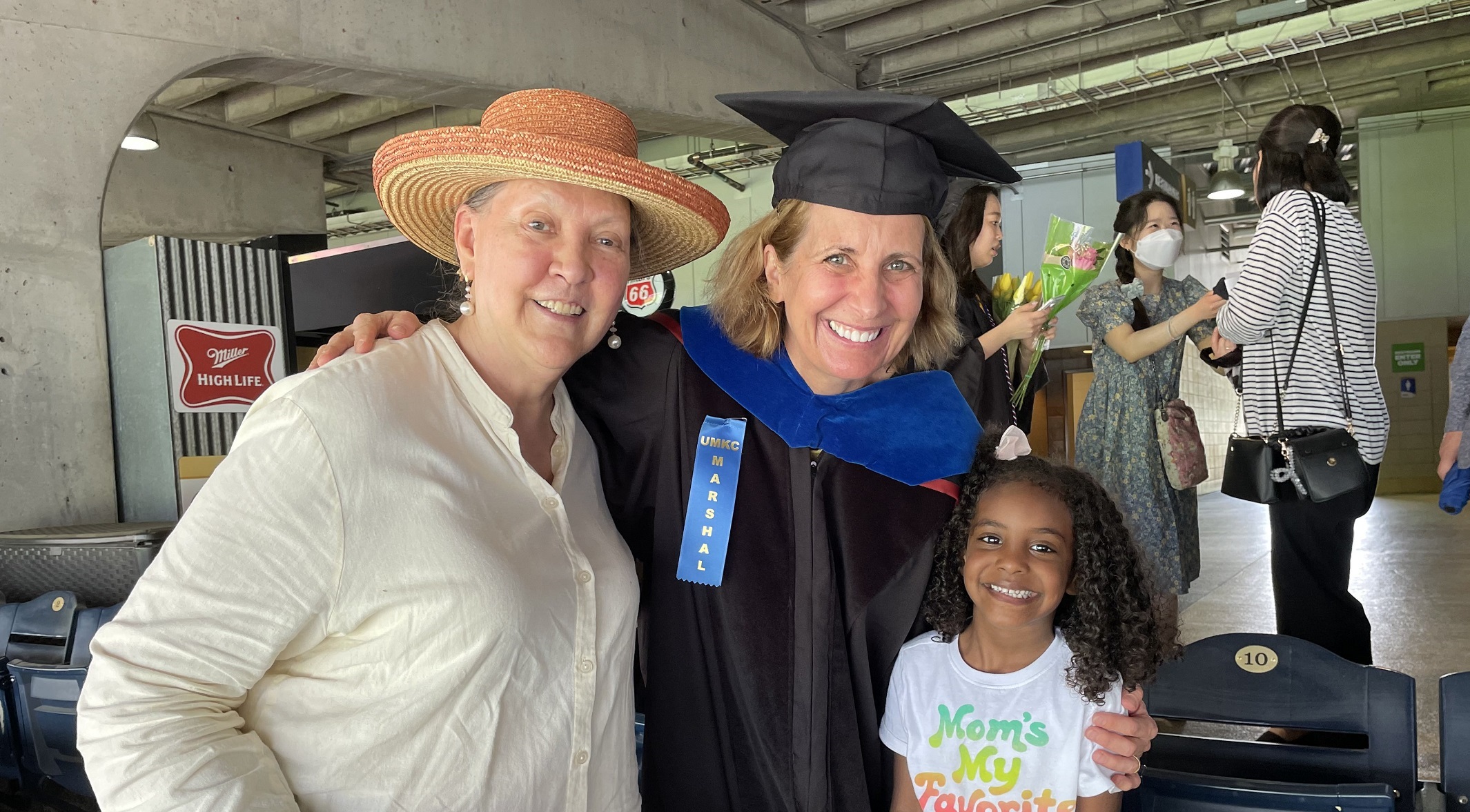
A new profession led to mentoring relationship, gift
Martha Childers, M.A. ‘08, EDSP ‘13 decided to become a counselor after working in libraries for 38 years. An influential relationship with Johanna Nilsson, Ph.D., a professor in counseling psychology, led to a gift to UMKC to establish the Johanna E. Nilsson Scholarship for Diversity and Courage in Psychology.
“I read an article that mentioned that in midlife one of the ways to ward off dementia is to do something completely different with your life,” Childers says. “I remembered that in high school I’d wanted to be a counselor, so I thought I’d pursue that.”
Sixty hours of academic work seemed like a significant commitment, but Childers was determined.
“Once I started the program, I understood why you would need that much coursework. There’s a lot more to counseling than meets the eye.”
During her studies, Childers took a class from Johanna Nilsson, Ph.D. At the end of the semester Nilsson brought her husband and children, who are twins, to meet her students.
“I just thought that was really nice,” Childers says. “After that I asked her to be my advisor. It was totally spontaneous, and she said, ‘yes!’”
It turned out that Childers’s instincts were good.
“Johanna never steered me wrong,” Childers says. “There were times that she made suggestions and I was unsure. For instance, she recommended that I take gerontology. And I said, ‘I am old!’ But she was right. I took two classes, and they were very valuable.”
Childers decided to honor Nilsson in an interesting way by establishing the Johanna E. Nilsson Scholarship for Diversity and Courage in Psychology.
“It’s the first thing I do at the end of the month – figure out my income and what I’m going to do with that 10 percent. It feels good to not be thinking just about myself. I’m thinking about others, which is really healthy.” — Martha Childers
“I donate 10 percent of my income every month,” she says. “I’ve worked in library science and as a counselor. I don’t make a lot of money, but I realized a few years ago that I could set up an endowment and that would honor people who are important to me and provide more security to the organization. A little bit every month adds up.”
Childers enjoys the practice because it is the manifestation of her focus on thinking about helping others.
“It’s the first thing I do at the end of the month – figure out my income and what I’m going to do with that 10 percent. It feels good to not be thinking just about myself. I’m thinking about others, which is really healthy.”
Nilsson was surprised by Childers’s gift in her honor.
“Honestly, I didn’t think I had a big impact,” Nilsson says. “Martha is fun to work with. She is a non-traditional student who has traveled a lot. Her kindness is overwhelming. I’m very honored by Martha’s gift.”
Childers and Nilsson worked on the parameters of the scholarship together. Nilsson often works with students who are refugees or have disabilities, who have to work harder to achieve their goals. For this reason, the pair settled on including “diversity and courage” in the name of the scholarship.
“We both agreed that we wanted to encourage and provide opportunity to students who are not ‘set up’ to get an undergrad degree,” Nilsson says.
For more information on endowments and other ways to support UMKC students, please visit UMKC Foundation, or contact Angela Machetta at amachetta@umkc.edu.
Jun 23, 2022
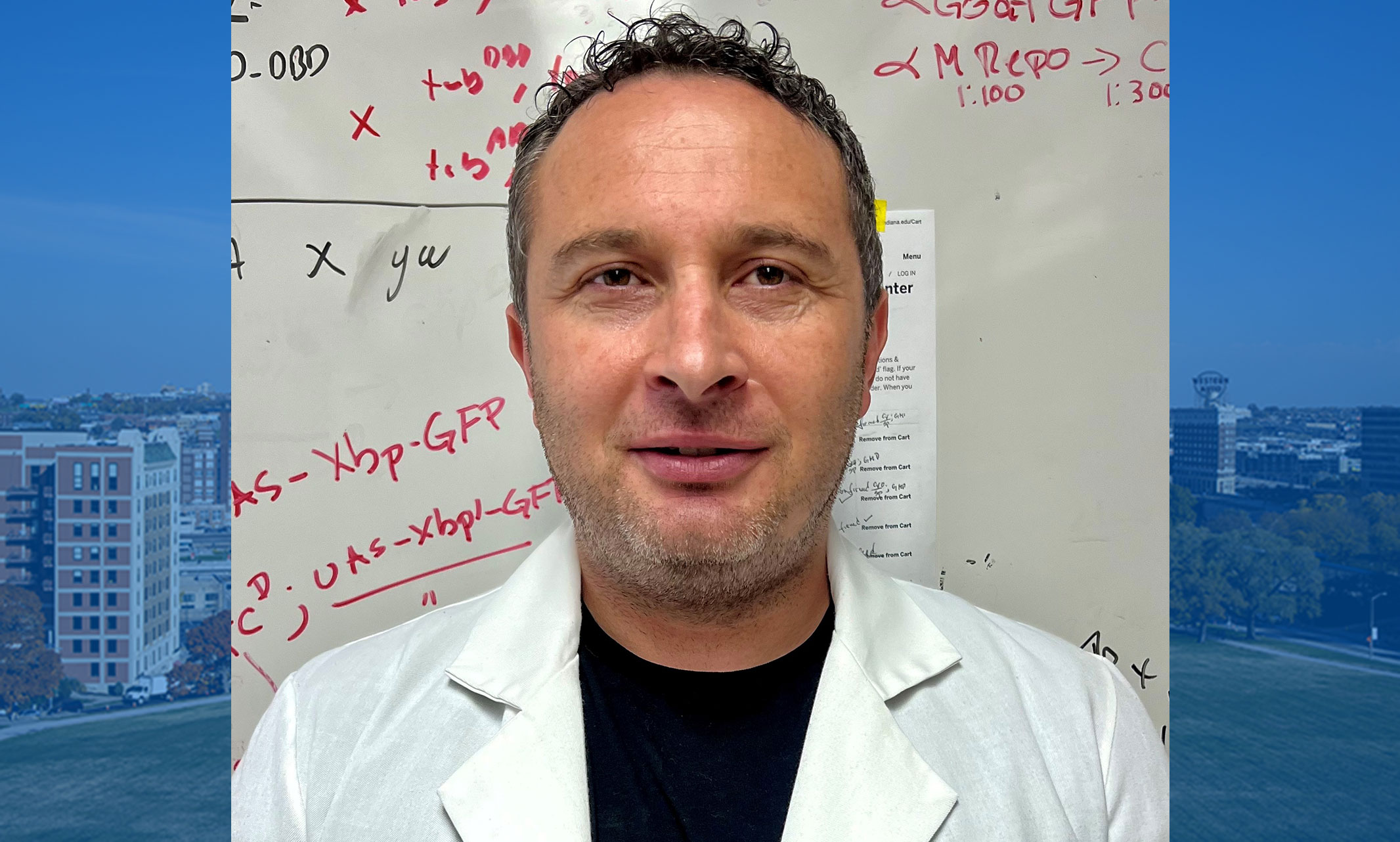
New faculty member attracted by collaboration opportunities
Haluk Lacin, Ph.D., decided to join the UMKC faculty based on his interactions with researchers and staff, and the possibility of departmental collaboration. His research focuses on neural circuit formation and animal behavior.
What brought you to UMKC?
The main reason that attracted me to UMKC is its collegiality. Everyone I interacted with at UMKC during my visits was easily approachable and put in extra effort to be helpful.
Recent changes bringing the School of Biological and Chemical Sciences together with the School of Computing and Engineering into the School of Science and Engineering will be very useful for me and other biologists who want to bring quantitative approaches to their field. Lastly, the school has become a vibrant place for research and teaching with the hiring of several new investigators in recent years.
What is the focus of your research?
In a nutshell, my research aims to understand how a complex nervous system is built during development. Each neural stem cell generates a unique population of neurons, which we call neuronal lineages. In our nervous system, neurons from millions of distinct neuronal lineages interact with one another to form functional networks. Each network - called a neuronal circuit - controls a unique human behavior, e.g., decoding visual information coming from the eyes or commanding quadriceps muscles for kicking a soccer ball. My research investigates how each neuronal lineage is generated and how they come together to form neuronal circuits controlling vital behaviors.
To address these questions, I study the assembly of the nerve cord (equivalent to our spinal cord) of the humble fruit fly, Drosophila. Similar to our spinal cord, the fly nerve cord shows lineage-based organization, but with neuronal lineages whose number is reduced by several magnitudes. In total, 34 distinct neuronal lineages form the fly nerve cord. Over the years, I have generated genetic handles to target and study individual neuronal lineages and with these tools, I have started elucidating the genetic, cellular and molecular control of neuronal connectivity and animal behavior.
What are your research priorities?
I recently have been awarded a research project grant from the National Institute of Health. First, we will investigate how a select group of genes dictate the neuronal lineages where these genes are expressed to form functionally meaningful neuronal circuits. Second, we will investigate how these neuronal lineages control animal behavior, i.e., are they required for walking or flying? We will also study how the removal of each of these genes from individual lineages where they are expressed affects the animal behavior. Lastly, we will complete the missing pieces in our genetic library with which we can target each neuronal lineage individually in the fly nerve cord.
What are you hoping to accomplish with this research?
Millions of people in the U.S. suffer from at least one neurological disease, many of which arise from perturbations in neuronal differentiation and/or circuit formation. Our research leverages the powerful fly genetic model system to uncover the cellular, developmental and genetic basis of neuronal differentiation, neural circuit formation and behavior. Given the highly conserved nature of nervous system development from flies to humans, our research aims to uncover conserved genetic principles that underlie neural circuit formation and behavior from flies to humans, which will inform on the cellular, developmental and genetic basis of neurological diseases in humans.
How involved are research assistants in your work?
I have been working together with a team of talented research assistants and my work would not be at its current level without their input. We have had opportunities to learn from one another. What I observed from my experiences is that working with others results in creativity, innovation, and most importantly better engagement.
Jun 22, 2022
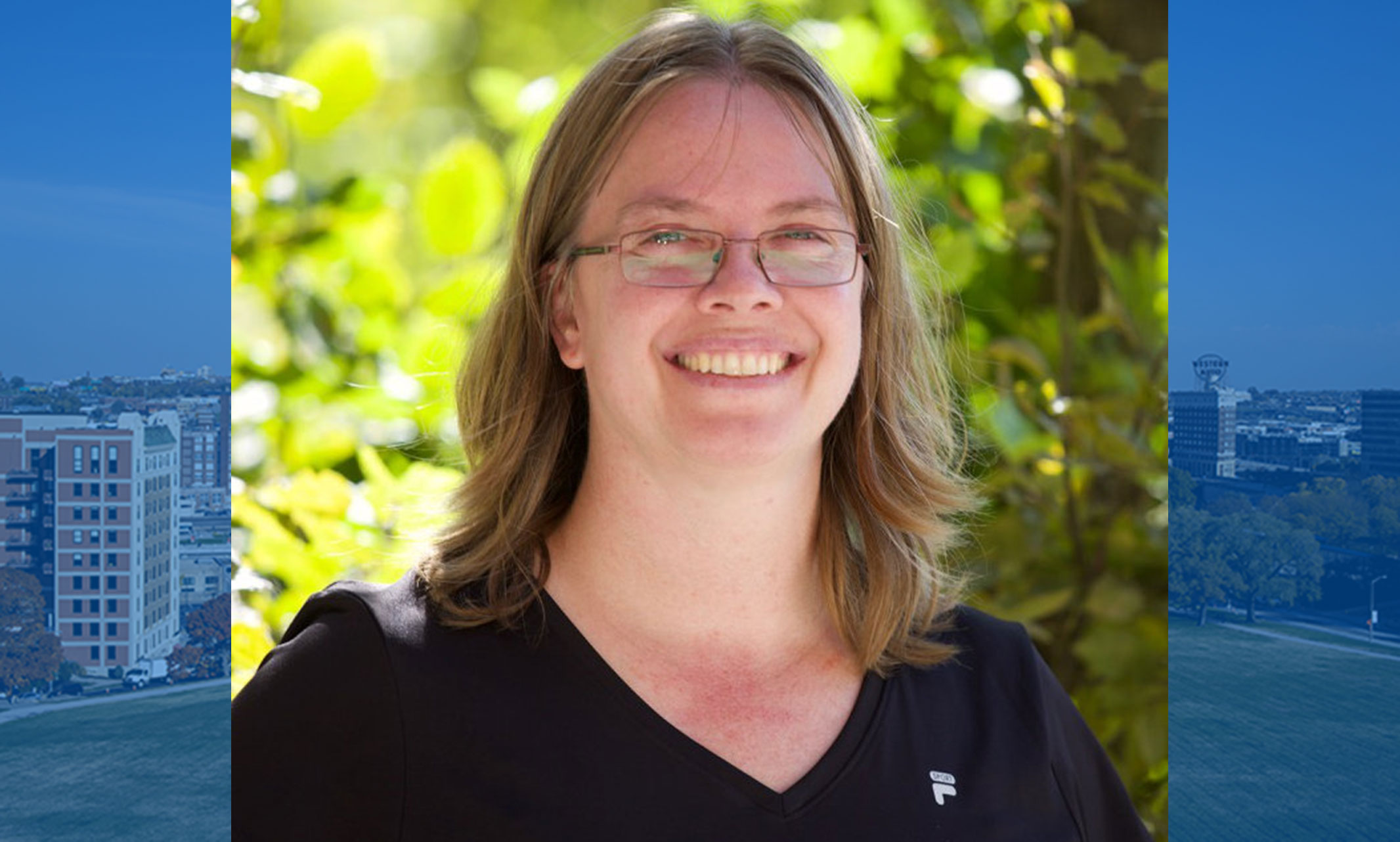
New researcher’s focus is microscopy, transcriptomics
Maria Spletter, Ph.D. is originally from the Midwest. She was thrilled when her expertise in microscopy, transcriptomics and muscle biology made her an ideal fit with the new School of Science and Engineering.
Spletter’s research focuses on how muscles attain different contractile properties during development. The proteins that build muscles are encoded by genes in our DNA, and one way muscles can fine-tune their function is by producing different versions, or isoforms, of the same gene through alternative splicing.
This process is important, and it is often disrupted in muscle diseases, leading to a loss of muscle function.
“My research interests are focused on understanding the regulation and function of RNA-processing during muscle development,” Spletter says. “To do this, we employ diverse techniques from developmental genetics and cell biology to transcriptomics, bioinformatics and biochemistry.”
Spletter’s background in Drosophila (fruit fly) genetics will integrate well with the diverse model organisms currently in use at UMKC. In addition, her lab uses Drosophila to study the proteins that regulate alternative splicing and determine which isoforms are expressed in different muscles.
Her team studies the role of the Bruno 1, Rbfox1, Scaf6 and Ime4 proteins in normal muscle development, and also how misregulation of these proteins leads to malfunction and muscle disease.
“Our long-term goal is to build a comprehensive understanding of the regulatory network of RNA-binding proteins that influence cytoskeletal assembly during the formation of skeletal muscular tissue during development, and that ultimately define the contractile properties of different muscle fiber types,” Spletter says. “This work is human disease relevant, as misregulation of RNA processing is observed in muscle disease, and a deeper understanding of RNA-binding protein function may lead to new therapies or drug targets.”
Spletter will begin her work at UMKC Sept. 1.
Jun 17, 2022
Sungyop Kim, University of Missouri-Kansas City professor of urban planning and design, said that the agency probably needs a more dependable fundi...
Although Kansas City’s bus system, RideKC, has celebrated accomplishments such as spearheading free fares and introducing electric buses, many riders say that only goes so far if there isn’t enough service, or if it’s not dependable.
Any solutions to RideKC’s problems become more complicated because they lie in the hands of 10 different jurisdictions that contract KCATA to offer service to residents.
“Transit service improvement requires more significant and more reliable transit funding,” Professor Sungyop Kim wrote the Kansas City Star in an email. “Funding-wise, I find state funding for KCATA is an area to push.”Read the full article from the Star here.
Jun 16, 2022
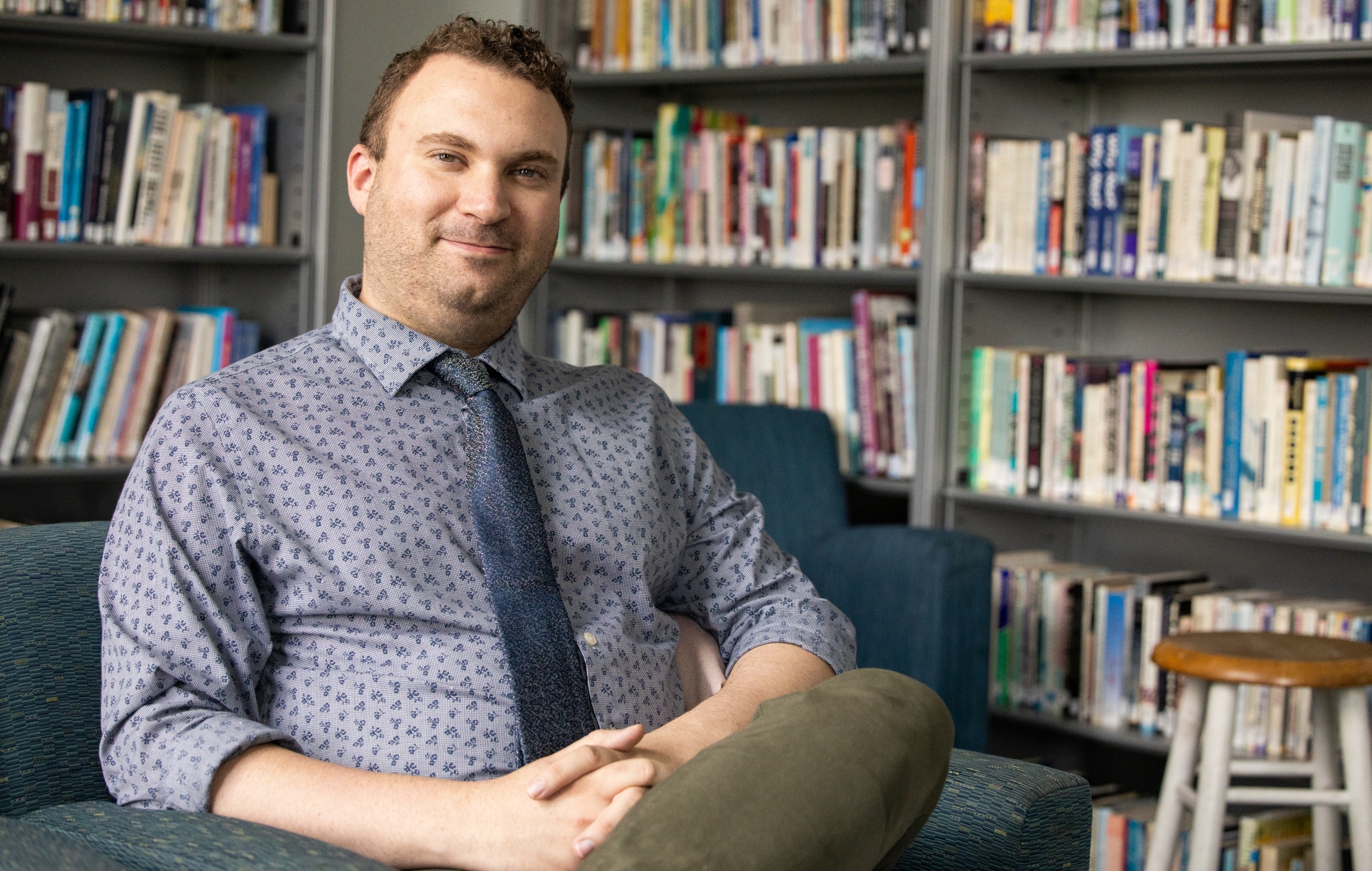
Storytelling leads to career in research and student services
When Zach Parker, assistant director LBGTQIA programs and services, completed an academically intense high school career, he decided to take a gap year. He worked at Disney World to pursue his dream to perform on Broadway. But his experience there revealed that he enjoyed storytelling and working with people more than he realized.
“After Disney I went back to school and began to work with stories and storytelling,” Parker says. “That led me to think about LGBTQIA stories and the research into those pieces.”
Parker was active in LGBTQIA organizations while he was in college at Wichita State University. When he started his graduate work, he moved past participation and worked in the center at WSU in addition to teaching the school’s first LGBTQIA literature course.
“I had students tell me, ‘I’ve never seen myself in a course before.’ That was wonderful and exciting for me as a professional.”
One of Parker’s priorities in his current position is focusing on reconnecting students and helping them find community again following the shutdowns of the COVID-19 pandemic.
“Hopefully we are moving toward more of an ‘endemic,’ and we can regroup around making friends, finding community and building resilience together.”
For Parker, part of that regrouping is reengaging students with the Rainbow Lounge in the UMKC Student Union.
“I’m excited to see students together building communities, because I know from experience that those communities will last beyond their four years here. Forming strong relationships creates resiliency for our students that will last past graduation.”
“It’s important to have a space for folks to be able to go to feel like they don't have to perform for others, and that they can really be authentic.” - Zach Parker
Parker recognizes that the ongoing media attention to gender identity and the varying views on recognition and accommodation can be overwhelming.
“It’s exhausting to have your existence and the fibers of your being debated on national television by folks who don't understand your experience, and who might not ever be able to understand your experience,” Parker says. “There's some really good research coming out right now, about the damage that happens to kids, even if a law never passes, of having divisive information on TV and having that debate go on.”
Parker responds to this pressure by creating a space where people feel that they don’t have to perform for others.
“It’s important for folks to have the opportunity to really be authentic. Sometimes that authenticity shows up as being really exhausted or angry. Those reactions are valid for all of us, especially for our students to understand that we have space for them and they're not alone.”
Jun 13, 2022
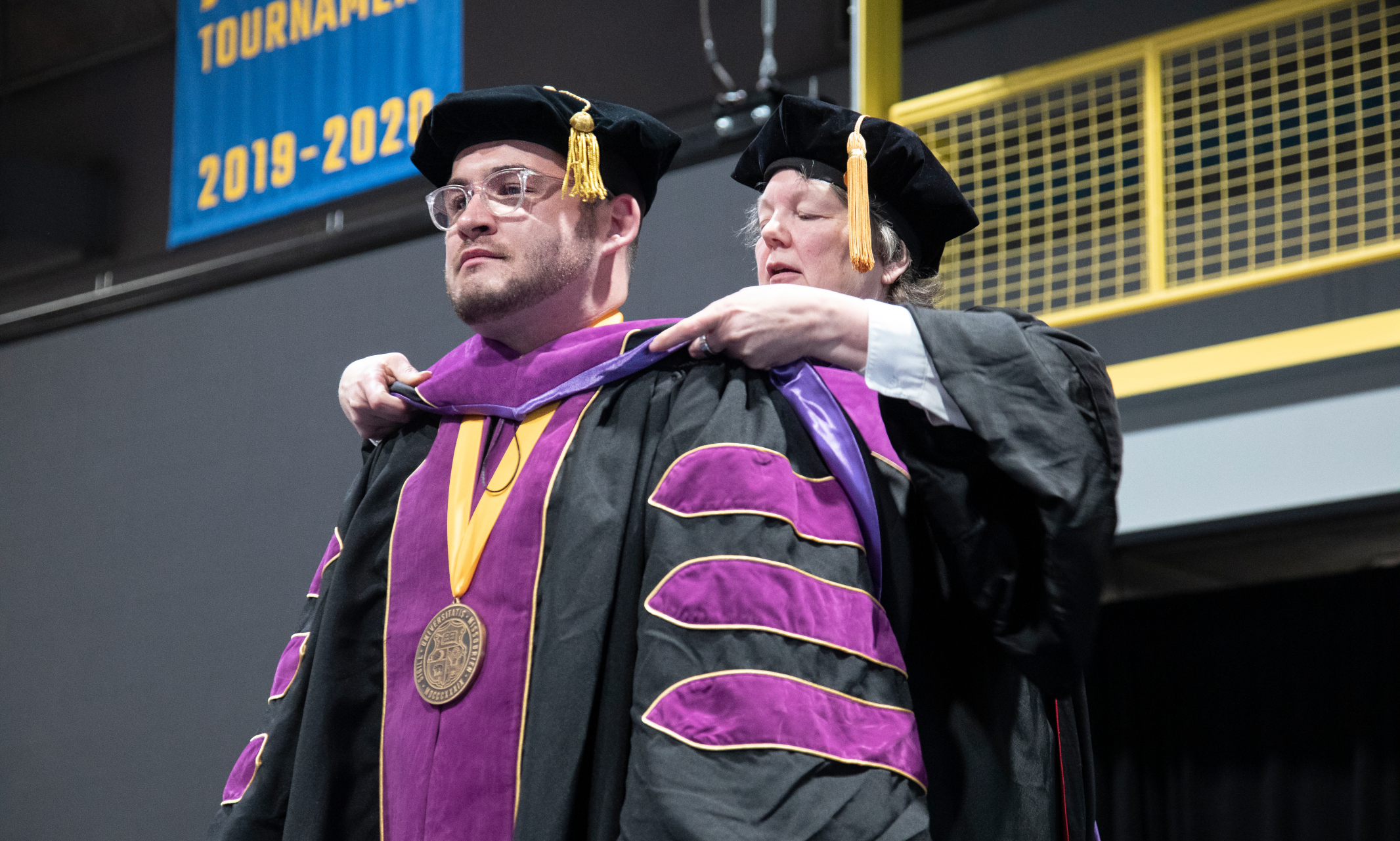
Remington Williams lived a life of service
Remington Williams (J.D. ’22) was a natural leader and caring human being who accomplished much, driven by a passion for helping others.
Williams, the student representative to the University of Missouri Board of Curators, died in a car accident June 8 on his way to get some food after a night of studying for the bar exam. He was 25 years old and had just graduated from the UMKC School of Law, where he was a member of the Law Review and Honor Court.
As student representative to the board of curators, Williams served as the students’ voice to the governing body of the University of Missouri System, which includes UMKC, the University of Missouri-Columbia, Missouri University of Science and Technology and the University of Missouri-St. Louis. He was enrolled in the MBA program at UMSL.
People came from across Missouri, and beyond, for his June 15 funeral at St. Andrew's Episcopal Church in Kansas City. A reception was held afterward at the UMKC Student Union. Curator Robin Wenneker and UM System President Mun Choi were among those who spoke at the church service.
“I think Remington would be so pleased that we have come together to support each other. He always had a way of bringing people together. And that makes me smile. Our presence today is a testament to that,” Wenneker said.
She lauded the way he made everyone he encountered feel seen and heard.
“He cherished each of his many relationships, spanning from childhood through high school and on through Georgetown College and stints at two different UM universities. His friends would come in from Kentucky, Ohio and Tennessee, among other places, to visit him in Missouri because they knew how important they were to him, and he was to them.”
She concluded, “I encourage all of us to do our utmost to live up to the high bar Remington set for kindness, compassion and striving to be our best selves. In doing so we pay tribute to the amazing life Remington led and the amazing life that was ahead of him.”
Choi shared a message from Gov. Mike Parson: “Remington was a great young man and impressive leader who was taken far too soon. We thank him for his service to his peers, the UM System Board of Curators and the State of Missouri,” Choi quoted the governor.
In his own remarks, Choi said Williams lived a life dedicated to service.
“His presence made this state, our communities – and each of us – better,” Choi said. “He was a passionate advocate for student interests to the Board of Curators. He was also a trusted advisor who helped advance our mission of service and excellence.”
“What I will remember most is his signature smile. It was always warm and inviting,” Choi said. “He was a student of life, and he kept exploring and expanding his horizons.”
Friends and associates remember him as involved, committed and upbeat, emanating an infectiously positive and optimistic attitude.
“Remington was a true role model who set an example for student leadership in a way that impressed students, faculty and staff,” said UMKC Chancellor Mauli Agrawal. “He accomplished so much and impacted the lives of so many in his all too brief time with us.” Williams was honored with a moment of silence at the UMKC Board of Trustees meeting June 13.
Claire Shipp, a 2022 graduate of Mizzou, served as executive director of the Associated Students of the University of Missouri, the student-led organization that advocates for student interests at the state level.
“We were really the only two people with system-wide student leadership roles, and we bonded over that. But we also became great friends outside of that,” Shipp said. “He was so well put together, so intelligent, but still a real human being. He made sure that everyone was comfortable in whatever spaces he was in.”
Shipp said Williams took his responsibilities as a student leader very seriously.
“He cared about the people that he was in the trenches for. He carried the burdens of all those 75,000 students, but he would overcome those challenges with such grace and still maintain a fun-loving attitude,” she said. “He was the person I would go to, to fill my cup back up and find hope.”
Remington had a lifelong history of taking on leadership roles and taking personal responsibility for making a difference in people’s lives. His mother, Colette Jones, recalled his resolve at the age of about 10 to help turn around the life of a homeless man he encountered on a church mission trip.
Their church youth group would make sandwiches and take them to encampments of homeless people. On one visit, a man known as “Sonny” ran away in fear when the church group stopped by.
Young Remington took off after him.
“Sonny told me later that he finally stopped and turned around, and when he looked into Remy’s eyes, he knew Remy was safe,” Jones said. Sonny stopped, they talked, and that launched a three-year effort by Williams and his family to get Sonny off the streets and into an apartment. Sonny has remained housed ever since, paying rent with Social Security and pension payments that Williams helped him obtain and volunteering on homeless outreach by the Salvation Army. He remains a close friend of the Williams family.
Williams went on to high school at the Pembroke Hill School, where he went on school-sponsored service trips to small villages in Guatemala, doing manual labor such as digging latrines.
“That’s why he got a degree in Spanish as well as business (at Georgetown College in Georgetown, Kentucky) – so he could go back there and continue working directly with the villagers,” Jones said. While an undergraduate, he continued to make regular trips to Guatemala, on his own, to work in the poorest villages.
His father, Marty Williams, was his baseball coach and helped ignite Remington’s lifelong love for sports. Marty Williams also guided his son’s path to becoming an Eagle Scout.
Williams’ passion for sports led to an autograph-seeking hobby that he pursued with typical zeal. It eventually evolved into a profitable online business selling autographs to other collectors.
At Georgetown, Remington served as student body president (2017-2018), president of his fraternity (2018-2019) and vice president of the Georgetown Activities Council (2018-2019). Williams also served in various capacities for the men’s basketball team and was an active member of both the Accountability Board and Honor Council.
Each year’s graduating class at Georgetown elects one of their own to be commencement speaker. The class of 2019 chose Williams.
He was also a proud graduate of the National Leadership Conference in Shelby, Michigan.
As much as the limelight shone on him, he always looked to share it freely and widely, friends said.
Curator Michael A. Williams, an attorney, knew Remington Williams as both a student representative and as an aspiring law student.
“Remington was the most dedicated and focused young man I have ever met,” Michael Williams said. “Whenever he was talking to someone, he would make them feel like they were the only person in the room.”
“It was awesome to see someone working so hard, trying to be the best that they could be, and still be committed to helping other people be the best that they could be as well.”
At Board of Curators meetings, Wenneker said, he loved to present examples of the accomplishments of other students from the four universities.
"He brought other people along with him. It was never just about him,” Wenneker said.
Wenneker said it was his commitment to representing the entire student body of the system that led him to enroll in the online MBA program at UMSL in 2021. He believed he would be a better representative by being enrolled in multiple universities.
Wenneker recalled Williams deciding to bring the student government presidents from the four universities, and Shipp, all together for a football game at Mizzou.
“They had so much fun being together. He was so proud of them. They were all undergraduates and he was in law school, so he took on kind of an advisory role with them,” Wenneker said.
Williams was appointed as student representative to the Curators by Gov. Mike Parson in July 2020. The UM System’s Office of General Counsel had recently extended an offer of a fellowship to him for the summer.
Jun 10, 2022
UMKC School of Law Class of 2022
The University of Missouri Board of Curators is mourning the death of Student Representative Remington Williams, who died in a car accident June 8.
“Remington was an outstanding individual and a tremendous asset to the Board of Curators,” Board Chair Darryl Chatman said. “He was actively engaged with the students at each of our four universities and worked to amplify their successes, promote their stories and ensure their concerns were heard. Remington was the best of us, and our thoughts are with his family and friends.”
“Remington dedicated himself to the service of the University of Missouri,” UM President Mun Choi said. “As a student of not one, but two System universities, Remington was deeply connected to his fellow students and advocated for their interests to the Board of Curators. He was committed to advancing the mission of the university and ensuring all students had the opportunity to receive an excellent education and an outstanding experience. He will be sorely missed.”
Williams was appointed by Gov. Mike Parson in July 2020. He was a recent graduate of the University of Missouri-Kansas City School of Law, where he was a member of the Law Review and Honor Court. He was also completing a Master of Business Administration degree from the University of Missouri-St. Louis. The System’s Office of General Counsel had recently extended an offer for him to serve as a fellow.
Williams earned a Bachelor of Science degree in Business Administration and Spanish from Georgetown College in 2019. As an undergraduate at Georgetown, he served as student body president, president of his fraternity and vice president of the Georgetown Activities Council. Williams was also a proud graduate of the National Leadership Conference in Shelby, Michigan.
The student representative to the UM Board of Curators serves as the students’ voice to the governing body of the University of Missouri System, which includes the University of Missouri-Columbia, UMKC, Missouri University of Science and Technology and UMSL. The student representative is appointed by the governor of Missouri and confirmed by the Missouri Senate, and serves a two-year term. Appointments rotate among the System’s four universities, so students at each institution have a rotating opportunity to represent the more than 77,000 students enrolled at UM universities.
Jun 09, 2022
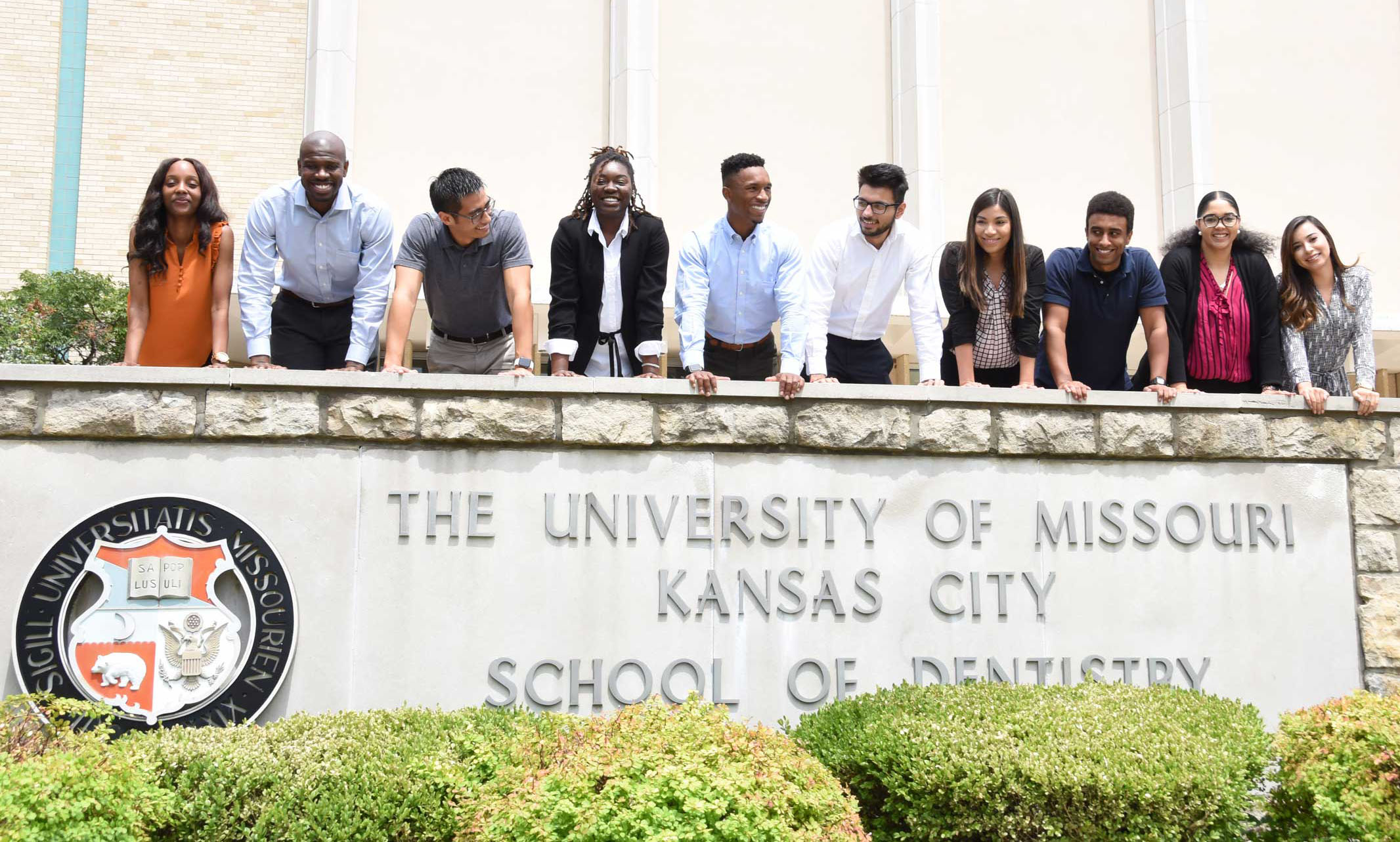
Partnerships with the University of Missouri-Kansas City’s School of Dentistry; BrownGirl, RDH; and Chiefs Flag Football, Powered By GEHA address h...
GEHA (Government Employees Health Association, Inc., pronounced G.E.H.A.) has a storied history of supporting its community with intentional giving, starting in 1937 when the organization was created to help fellow postal clerks after the Great Depression.
This spirit carries through to today, where philanthropic efforts are focused around health equity and positively impacting the social determinants of health. The oral health focus of GEHA Solutions, Inc., a wholly owned for-profit subsidiary of GEHA, has provided an opportunity to make a significant vote toward change by investing in three areas that affect community health.
Within the dental and dental hygiene fields, many communities of color are underrepresented within these industries. According to the American Dental Association, fewer than 11% of American dentists come from African American/Black, Hispanic/Latinx and American Indian/Alaska Native/Pacific Islander backgrounds, compared with these groups comprising 34.4% of the U.S. population. This can affect long-term health outcomes in many ways: apprehension and omission of care appointments, cultural and language misunderstandings and peer-to-peer dentist learning opportunities to better serve patients. To create meaningful, sustainable change, GEHA Solutions has created a $150,000 scholarship and fellowship investment with the University of Missouri–Kansas City’s (UMKC) School of Dentistry to fund opportunities for students representing historically marginalized communities to advance within these industries.
Representing the largest gift of its kind to the UMKC’s School of Dentistry’s Dr. Roy James Rinehart Memorial Foundation in more than a decade, these investments include five $20,000 dental scholarships, five $5,000 dental hygiene scholarships, and five $5,000 pre-dental fellowships to prepare rising dental school students for testing and interviews. Engagement opportunities throughout the school year with GEHA leaders will also assist in preparing these students for future successes. “GEHA Solutions and the School of Dentistry share a mutual interest in culturally diversifying the oral health workforce through the dental and dental hygiene programs at UMKC,” said Steven E. Haas, DMD, JD, MBA, UMKC School of Dentistry dean. “GEHA Solutions’ generosity will help alleviate some of our potential and current students’ financial burdens and allow them to better focus on their goals. The scholarships GEHA Solutions is providing also will help us to attract and retain the best qualified and most strongly motivated historically marginalized students who seek to represent their communities. We are so very grateful for this unique partnership.”
Consistent with this theme, GEHA Solutions has partnered with national nonprofit BrownGirl, RDH for a $50,000 investment in scholarships and continuing education opportunities for historically marginalized communities pursuing a career in dental hygiene. When most of a patient’s dental experience is spent with a dental hygienist, the opportunity for impact toward health equity was a strategic investment for industry growth. These 16 need-based scholarships will be provided to students throughout the United States, ranging from coverage of tuition to dental loupes and equipment. GEHA Solutions will also be the first presenting partner of the 2022 BrownGirl, RDH Leadership Conference, Presented by GEHA Solutions, held in Charlotte, North Carolina, from November 11–13. “Four years ago, an organization like BrownGirl, RDH did not exist. Today, not only are we nationally recognized, but we have brought to the forefront the lack of diversity in dentistry and the importance of introducing the field of dental hygiene to minority students,” said Martelle Coke, founder of BrownGirl, RDH. “BrownGirl, RDH is proud to partner with GEHA Solutions to continue propelling our mission forward.”
Youth sports communities offer great experiences for wellness and mobility, but with this comes a risk for oral impact injuries. According to the American Academy of Pediatrics, athletes are 60 times more likely to suffer harm to the teeth if they are not wearing a mouthguard. In the spirit of using GEHA’s partnership with the Kansas City Chiefs as an intentional tool for health equity and community collaboration, GEHA Solutions will provide 20,000 GEHA/Chiefs co-branded mouthguards to the youth participants of the Chiefs Flag Football, Powered By GEHA program this summer. Providing these safety tools allows for participating families to experience one less expense as an entry point to physical team activities.
“From minimizing youth sports injuries to allowing more communities to see themselves in dental and dental hygiene care, GEHA Solutions is committed to being a bridge toward improved oral health and inclusive oral health practices,” said Richard Bierman, J.D., GEHA Solutions President. “Through these intentional partnerships, our investments can evolve population health through students’ lived and academic experiences. We hope that this diversified strategy around health equity inspires others to take action, as well.”
About GEHA
GEHA (Government Employees Health Association, Inc., pronounced G.E.H.A.), founded in 1937, is a nonprofit member association and the largest dental and second largest medical benefit provider of federal employees exclusively serving 2 million current employees and retirees, military retirees and their families. GEHA’s mission, to empower members to be healthy and well, is demonstrated through its focus on innovation as well as providing members with access to one of the largest medical provider networks nationwide.
Headquartered in Lee’s Summit, Missouri, GEHA is one of the largest employers in the Kansas City metro area. For more information, visit www.geha.com.
About GEHA Solutions, Inc.
GEHA Solutions is an indirect, wholly owned subsidiary of GEHA established in 1997 to market GEHA's Connection Dental® Network as a solution to lower claims costs for dental payers. Today, GEHA Solutions offers multiple dental PPO networks for lease, as well as a Medicare Advantage Network Option. As one of the nation’s leading dental network leasing companies, GEHA Solutions’ dental networks improve accessibility for clients such as third-party administrators, insurance companies and self-insured employer groups.
About the University of Missouri-Kansas City (UMKC) School of Dentistry
Located in Kansas City, Missouri, UMKC School of Dentistry serves as a leader in the advancement of oral health care through exceptional educational programs, scientific inquiry, patient care and service to society. For more information, visit dentistry.umkc.edu.
About BrownGirl, RDH
Founded in 2018, BrownGirl, RDH (Registered Dental Hygienist) is a non-profit organization promoting cultural diversity within the dental hygiene field. BrownGirl, RDH offers scholarships and supplemental support to dental hygiene students covering costs outside of tuition. These include clinical supplies, equipment, loupes and national and clinical board fees. For more information, visit browngirlrdh.org.
Jun 08, 2022
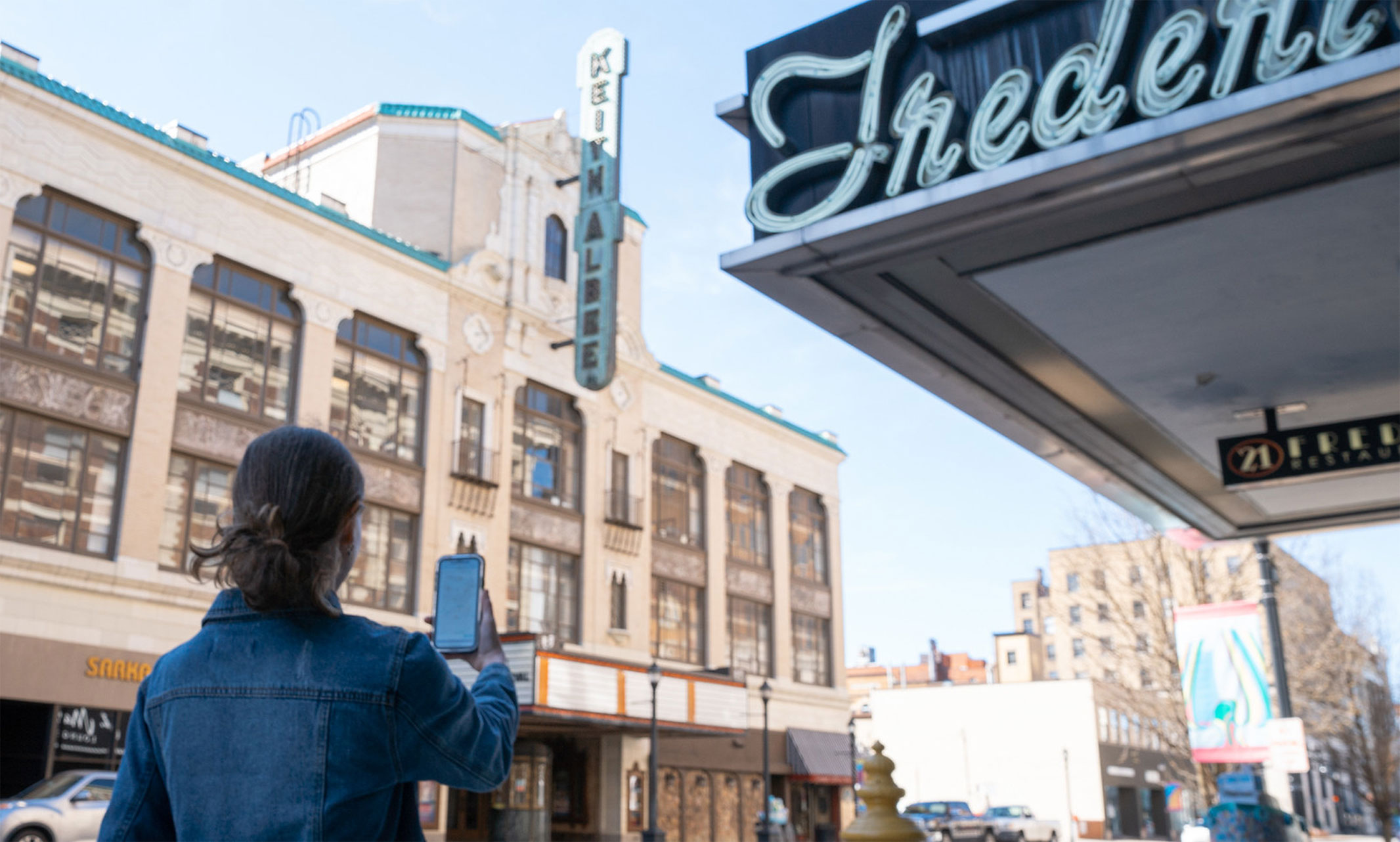
App developed by UMKC history professor now includes immersive virtual tours
Imagine if all you could discover the history behind buildings and other landmarks as you move through a city, or with the touch of a button, you could experience a guided walking tour that included first-hand accounts. Thanks to the work of over 500 museums, historical societies, universities, libraries and other organizations around the country, that’s now a possibility in the free mobile application, Clio.
“Clio picks up your location when you're in the app,” said David Trowbridge, a professor of history at UMKC and the app’s developer. “There's an arrow that will guide you and tell you how many feet you need to go. You can take a walking tour, browse nearby landmarks or even create and save your own itinerary based on a growing library of over 35,000 landmarks throughout the U.S.”
David Trowbridge, developer of Clio
Clio began as a local history project at Marshall University, where Trowbridge was teaching at the time.
“I was just trying to figure out a way to really reach my students,” Trowbridge said. “They had a very strong sense of place, of things in their hometown, things in their county. So, I said ‘Let's start with that. Tell me the history of a place that matters to you.’”
Students embraced the challenge, and before long, draft articles that began with online research inspired students to visit libraries and archives, make phone calls, and record interviews of people in their community.
“When students found one source, it led them to another and they cared so deeply about getting the history right that they often edit their Clio entries after the semester ends,” Trowbridge said. “Can you imagine a school project you want to keep working on the project when the class is over?”
Eventually the project outgrew his technology skills, but Trowbridge and his students wanted to keep it going.
“At that time, I barely used a smart phone, but when I saw the way my students dug in to the project, I knew I had to keep building,” he said.
Trowbridge formed a non-profit so that Clio would always be free and open, and soon, what began as a class project turned into a website and app used by other historians to share the history of their communities. He named the platform Clio in honor of the ancient muse of history. Funded by donations and grants, the app grew from the entries of one class to more than 38,000 entries all across the nation, including 1,400 walking tours that allow users to experience the history around them in real time. No cell phone to download the app? No problem. Anyone with internet access can browse the entries in a web browser as well.
As museums and historical sites around the country were working to deliver their experience in a virtual world, Trowbridge worked to build a free platform that was intentionally designed for museums and sites.
“I looked at the virtual tours that were being created during the pandemic, and they were pretty good,” Trowbridge said, “but I knew we could build something a little better that could work both virtually and in-person.” The solution was a 360° immersive experience, complete with museum maps and interactive content that allowed you to see extra materials and videos from museum experts, something you do not always experience at museums when you visit in-person. Trowbridge uses a LiDAR scanner connected to a 360° camera to build an interactive map and then records and embeds text, video, photos and links related to each artifact and exhibit.
Even after this huge addition to the app, Trowbridge isn’t going to stop there. In addition to expanding into STEM and Art exhibits, next steps for Clio include geofencing, so users can get push notifications about entries when they’re out and about on vacation or in their hometown.
“One of the major points is the serendipity factor,” Trowbridge said. “You can’t search on Google for what you don’t know. It works a lot better if you just open up the app and it shows you what's nearby.”
If you are interested in exploring Clio for yourself, it is available in app stores and online at theclio.com.
Jun 07, 2022
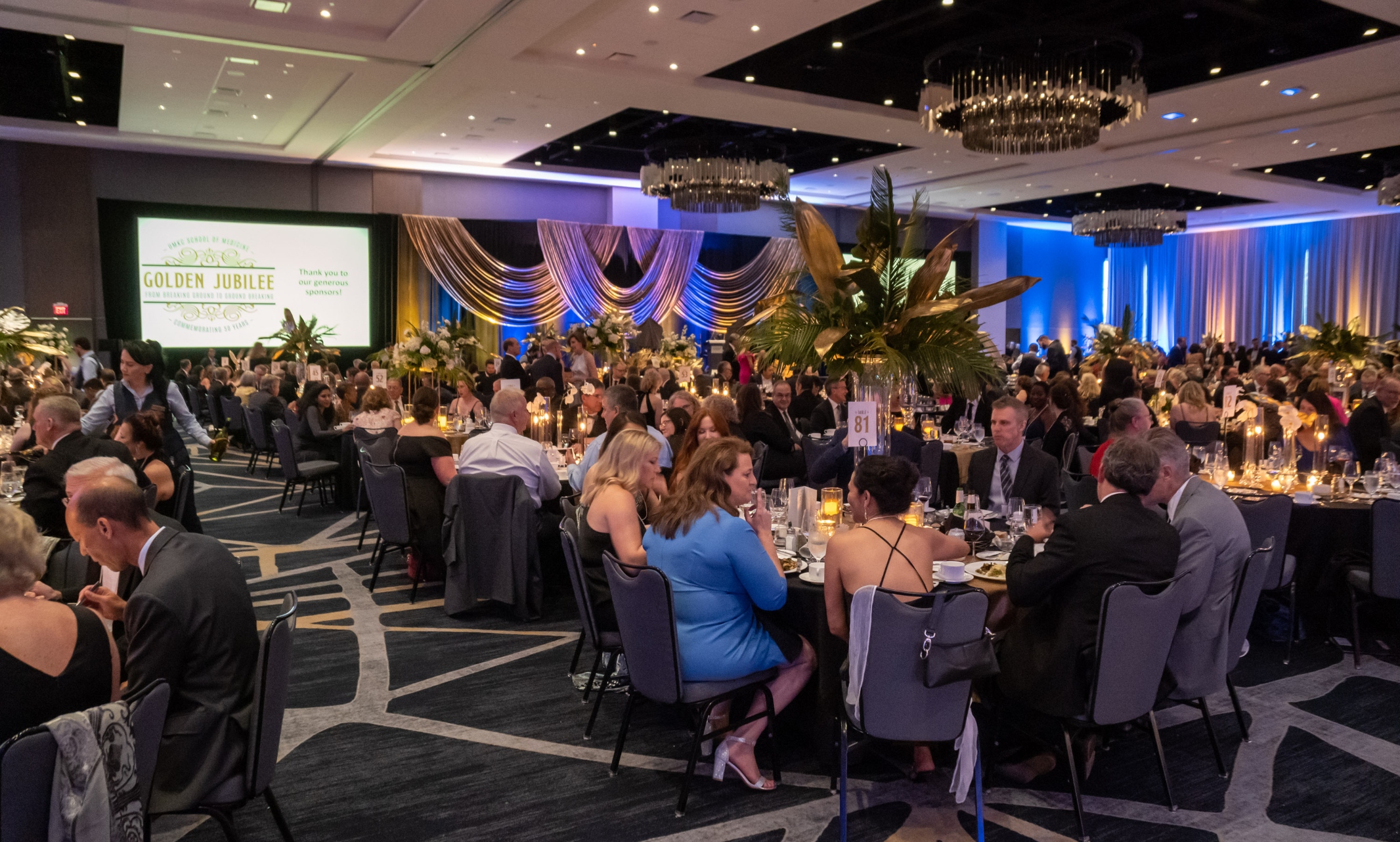
Alumni and community leaders honor successful past and promising future
The University of Missouri-Kansas City School of Medicine this weekend celebrated its rich 50-year history as a leader in innovative healthcare education and delivery in the urban core of Kansas City, and its future potential.
Event chairs Rachael and Nelson Sabates, (B.A. ’83, M.D. ’86) and honorary chairs the Honorable Brenda Shields and Charlie Shields, president and CEO of University Health, welcomed more than 800 guests including community supporters to the event, which raised close to $600,000. Michele Kilo, M.D. ‘84 and her team of alumni liaisons were critical to raising alumni awareness of the event. Nearly 400 UMKC School of Medicine alumni attended to celebrate 50 years of excellence.
Mary Anne Jackson (M.D. ’78), dean of the medical school, recognized Lucky Chopra (B.A.’91, M.D.’92), as the recipient of the 2022 UMKC School of Medicine Alumni Achievement Award.
“Dr. Chopra’s entrepreneurial career began while he was still in his final year of radiology residency,” Jackson said. “Working out of his garage, he purchased an old milk truck and converted it to carry a ‘barely portable’ radiology X-ray machine and began contracting with local Houston nursing homes to provide imaging services without the patient having to travel. His company, Advanced Diagnostics Healthcare, was born.”
"Four thousand alumni strong, we are the backbone for health care in a multitude of communities, serving as innovators and leaders in clinical care, as educators, department chairs, section chiefs and medical school faculty, as leaders in diversity and advocacy, and national leaders in research.” - Mary Anne Jackson, M.D., dean UMKC School of Medicine
Jackson celebrated the school’s outstanding legacy beginning with the first dean, Richardson K. Noback, M.D., who will be 99 years old this year, and the late E. Grey Dimond, M.D., who developed the accelerated curriculum and docent concept that is now a part of medical programs across the county.
Jackson acknowledged the tight connection between the school and Kansas City.
“We are the anchor to healthcare in the urban core and beyond,” Jackson said. “Teaching students how to use information, how to approach ambiguity and uncertainty and to think critically about challenges in medicine and biomedical science, continues to be part of our DNA. Four thousand alumni strong, we are the backbone for health care in a multitude of communities, serving as innovators and leaders in clinical care, as educators, department chairs, section chiefs and medical school faculty, as leaders in diversity and advocacy, and national leaders in research.”
Jackson noted the significant contribution of the school’s clinical affiliates and their dedication to student education by providing opportunities for students to participate in care for diverse patient populations and to see cutting edge medical care and its affects.
“We are grateful for the strong partnerships with University Health, Children’s Mercy, St. Luke’s Health System, Research Medical Center, the Center for Behavioral Medicine, the Kansas City VA, Advent Health and Liberty Hospital.”
New partnerships have led to the student opportunities and advancement of health care statewide.
“In 2021 we launched our additional campus in St. Joseph, Missouri and welcomed our newest affiliate, Mosaic Life Care, to recruit, prepare and encourage these students to become part of the primary health community in rural Missouri counties,” Jackson said.
After highlighting the outstanding successes of alumni, UMKC chancellor Mauli Agrawal recognized the event chairs for their untiring leadership and support of the School of Medicine.
“This spectacular event is much more than a party,” Agrawal said. “This evening represents and celebrates generations and decades – literally five decades – of students, graduates, critical health care providers and their teachers. Just as the UMKC School of Medicine was launched with an innovative vision of healthcare education five decades ago, we move into the next fifty years with an exciting vision for the future of the school.”
Jun 06, 2022
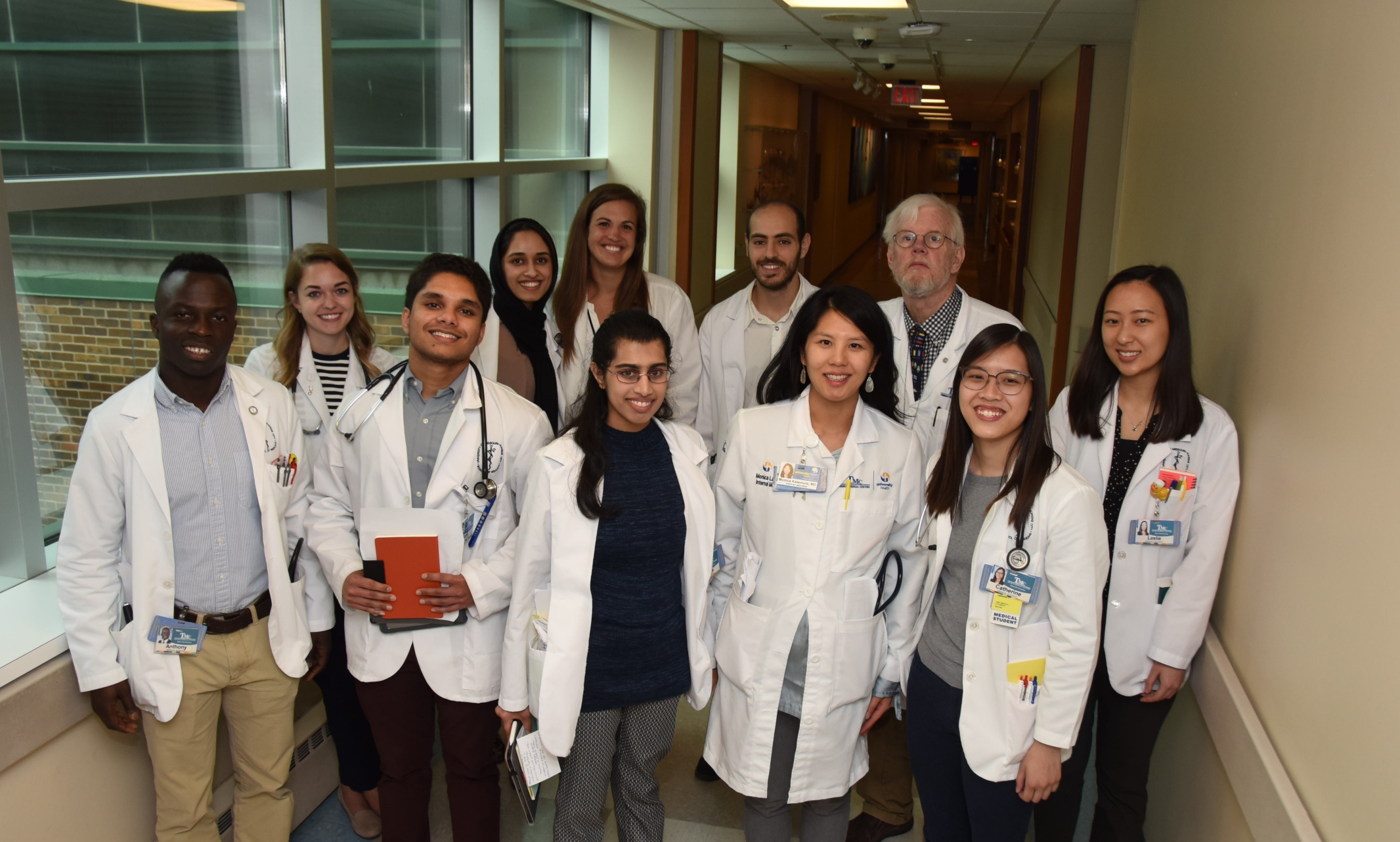
A look at the unique qualities, accomplishments of the UMKC School of Medicine
Fifty years ago, UMKC launched a bold experiment in educating the medical leaders of the future. Today, the UMKC School of Medicine is a cornerstone of Kansas City’s medical community.
Along the way, the school has grown into a national leader and trend-setter in medical education with innovative research that has improved the health and well-being of Kansas City, the state of Missouri and beyond.
Here are 5 things that make UMKC’s School of Medicine so special:
The UMKC School of Medicine is one of only two medical schools nationally that accepts students upon high school graduation and puts them through a rigorous program that earns them B.A. and M.D. degrees in just six years. Upon entering the B.A./M.D. program, students are classified as professional students. They begin studying medicine on their first day and clinical experience begins immediately. The initial two years also include courses leading to bachelor’s degrees in liberal arts, chemistry or biology. Clinical experiences increase in the third year, when students work together one-half day a week in an outpatient continuing care clinic. They also work on two-month internal medicine rotations throughout each of their final three years.This unique and innovative curriculum provides students with early and continuous patient-care experience and fully integrates liberal arts/humanities, basic sciences and clinical medicine. The learning environment de-emphasizes competition and encourages learning through close faculty-student interaction and student partnerships.
As a foundation of UMKC’s medical education program, the docent system takes the best of apprenticeship learning and combines it with small-group teaching, mentoring, peer coaching and other techniques. Students start their education by joining a docent team, where they learn from one another, as well as from faculty physicians known as docents. In this setting, docents provide clinical instruction while also guiding students’ personal and professional development. The system develops the attitudes, beliefs, competencies, habits and standards students need to be the best physicians possible.
In 2021, the school expanded its program to St. Joseph to address the state’s rural physician shortage. The new campus is a partnership with Mosaic Life Care and is aimed at increasing primary care providers to improve patient access throughout Missouri. The disparities in care in rural areas result in higher rates of death, disability and chronic disease for rural Americans, and have intensified during the COVID-19 pandemic. Expansion of the UMKC medical school to the northwestern region of the state will serve to bridge this gap, knowing that students training in rural programs are three times as likely to remain in practice in those areas.
Throughout its history, the UMKC School of Medicine has established a strong tradition of community outreach – a practice its students engage in early on and one that graduates carry with them into their careers.
Our Healthy Kansas City Eastside, a community health collaborative created to address COVID-19 in underserved neighborhoods, administered more than 11,000 vaccinations in Kansas City neighborhoods with high health care disparity. Backed by nearly $5 million in CARES Act funding through Jackson County, Jannette Berkley-Patton, Ph.D., professor of biomedical and health informatics and director of the UMKC Health Equity Institute, took up the challenge to bring the message as well as the needed vaccines to Kansas City communities with some of the lowest vaccination rates in the city.
The Sojourner Health Clinic was founded by a group of medical students in 2004. Students have organized this program as a service-learning project: Students from across the health sciences campus learn about working with vulnerable populations outside of the hospital setting and how to create and sustain a free health clinic, while providing a needed service to the Kansas City community.
Students Training in Academia, Health and Research (STAHR) Partnership is a two-part program to increase the number of students from disadvantaged backgrounds entering health-care programs and to better prepare them for success.
UMKC is one of 20 universities in the country where Dentistry, Medicine, Nursing and Health Studies, and Pharmacy share a single, walkable campus, fostering exceptional student learning opportunities. Why does that matter? That co-location encourages interprofessional collaboration on clinical care and research from the get-go. Together, our four health sciences schools share the vision and spirit, along with the resources and academic programs, to launch you into the right health professions career. Our unique structure positions UMKC as a leader in interprofessional education -- a cross-discipline approach that prepares students to provide the best patient care in a collaborative team environment. UMKC is Kansas City’s top provider of health care professionals.
More information on the School of Medicine’s 50th Anniversary
Jun 03, 2022
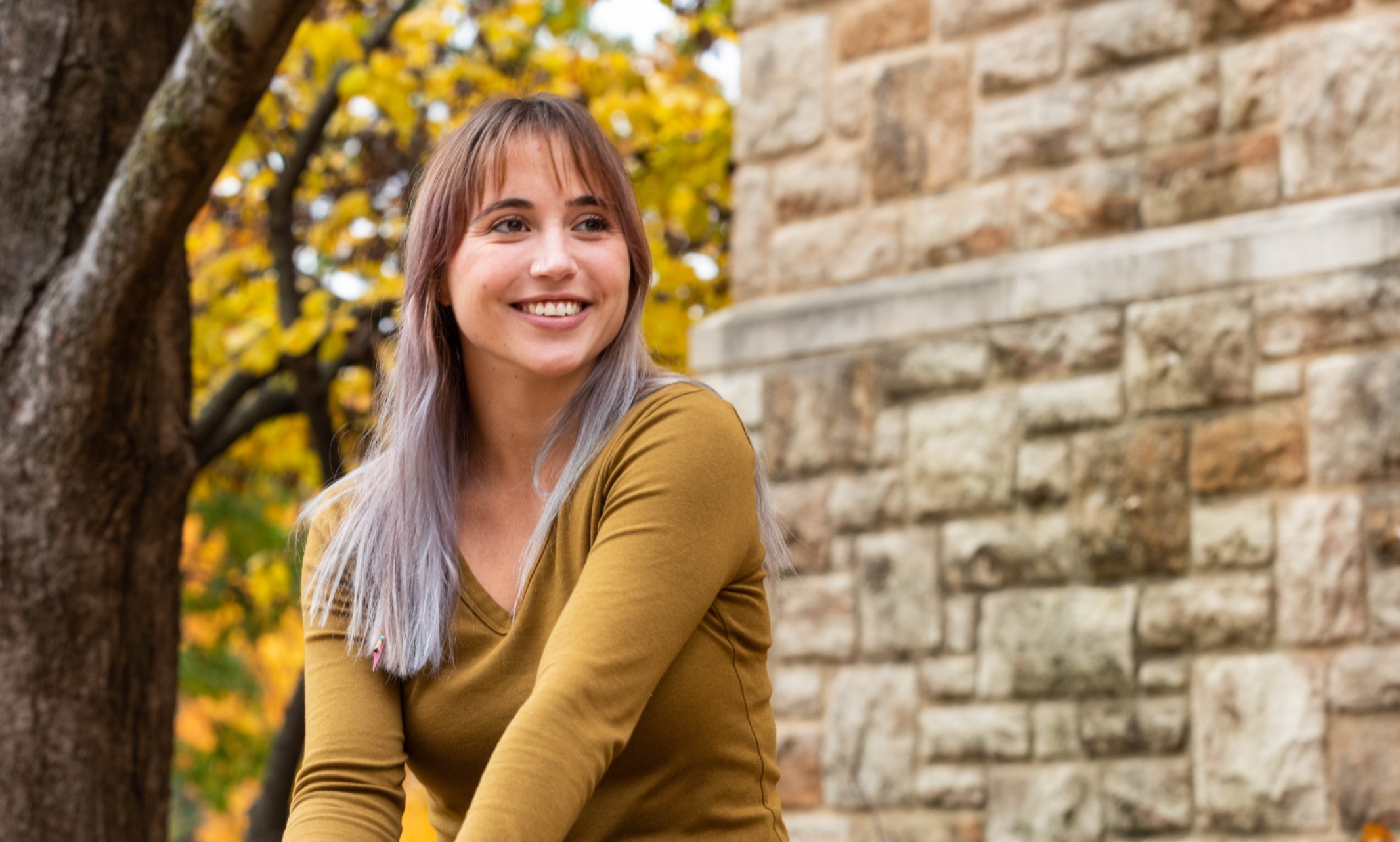
Amanda Pierce has dedicated her adult life to making more sustainable communities, on the ground and in the lab
Roos don’t just dream, they do. Our students turn ideas into action every day. Get to know our people and you’ll know what UMKC is all about.
Amanda PierceGraduation year: Spring 2022UMKC degree program: B.S. Environmental ScienceHometown: Leawood, Kansas
Amanda Pierce (B.S. ’22) lives her commitment to environmentalism. Literally. While pursuing projects, she has lived in her car, and in a tent on the beach in Tulum, Mexico.
Before enrolling at UMKC, Pierce spent five years traveling across Peru, Belize, Mexico, Florida, Alabama, Louisiana and Texas working on environmental projects. She built gardens and houses, saved animals from fishing nets, volunteered on nature reserves, cleaned trash from beaches and dug wells.
Pierce during her volunteer trip in Mexico. Photo courtesy of Amanda Pierce
After several years of seeing the effects of climate change up close, she wanted to do more. So, she moved back home to Kansas City and enrolled in the environmental science program at UMKC.
“I saw people in these underdeveloped and unprivileged countries who wanted to live cleaner and healthier, but did not have the means. I saw things like plastic and fossil fuels and driving our cars were the problem,” said Pierce. “I knew I had to do something about it. It’s now or never and we’re running out of time.”
Just like she did with her volunteer work, Pierce poured herself into her studies. In addition to her coursework, Pierce took part in the inaugural Emerging Research Scholars cohort, a UMKC program launched in 2021 to support undergraduate research.
“That was really cool. I highly recommend it for anyone researching at UMKC,” said Pierce.
She secured grant funding to conduct two undergraduate research projects. The first study was conducted in the 2021-2022 academic year. Pierce found that a certain type of moss removed carbon dioxide and balanced the pH level in water samples collected from Indian Creek in Johnson County to near drinking-water level. She presented her findings at the 22nd Annual Symposium of Undergraduate Research and Creative Scholarship where she received a Presentation of Distinction, which recognizes excellence in research.
Pierce was awarded a Presentation of Distinction for her research in Spring 2022. Photo courtesy of Amanda Pierce
“I’m a real scientist now,” Pierce said. “I had the opportunity to share my findings and get over the fear of not being able to talk about stuff because I was still a student. It made it feel more professional.”
Pierce went to two other colleges before coming to UMKC. She said her professors at UMKC were supportive and made her feel like she was part of something bigger, something she said she had not had in her previous college experiences.
“Dr. Sun is great, I love his classes. Professor Davies was my mentor and I had so much fun in her class. She’s just like that really cool aunt that everybody wants to go hiking with. I love Professor Graettinger. I didn’t want to graduate because I didn’t want to leave her class,” said Pierce.
She’s now pursuing her Geographic Information System (GIS) certification and conducting a Summer Undergraduate Research Opportunity research project focused on alternative ways to grow duckweed, which is the fastest-growing plant on earth and effective at removing carbon dioxide.
“My whole career future is wetland-related,” said Pierce. “Definitely all of my research is going to be related to removing carbon from the atmosphere.”
Pierce graduated in 2022. Photo courtesty of Amanda Pierce
In addition to all the knowledge she has gained through her classes and research, Pierce said she has also learned about herself in college. Her goal is to take what she has learned and be a lab technician or a field worker.
“I’m excited to use the skills that I’ve worked so hard for. I used to think so globally, but now I’m more realistic. More locally, wherever I go, I want to make a difference,” said Pierce. “I’ve learned that if you really care about it and you really want it and you put in the time for it, it will pay off.”
Jun 02, 2022
